Foodwise Summer
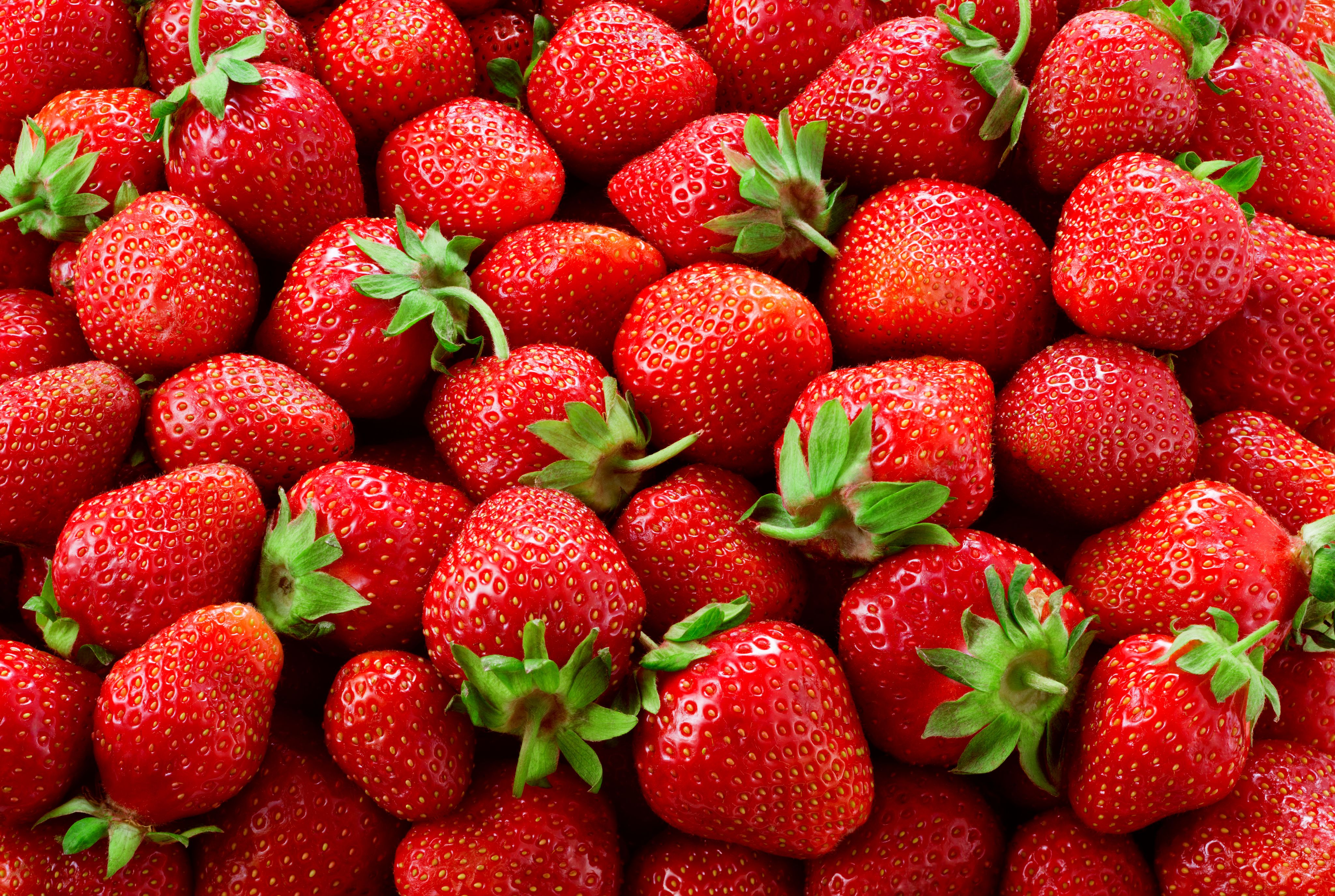
Welcome to the last Foodwise for 2021!
Once again, we’ve reached the end of a challenging and disruptive year, however, through it, we’ve not only managed, but we’ve found new ways of doing things, have adapted, and have no doubt become more resilient.
We must remember to keep food safety front of mind going into a wet and humid summer because as the temperature rises, so too does the risk of foodborne illness.
By following a few common sense food safety rules such as always observing good hygiene and remembering to keep it hot, keep it cold, keep it clean and remembering to check the labels, you can ensure your festive season stays festive and your loved ones stay happy and healthy.
Since 2004, the Food Authority has worked closely with industry and our partners to identify food safety risks and actively reduce them, and with your support, we will continue to do so in 2022.
Our Helpline will open on all NSW business days from 8.30am to 5.30pm. Email food.contact@dpi.nsw.gov.au or call 1300 552 406. Don’t forget to search our website too.
Thank you once again for your readership in 2021 and we wish you a happy and safe festive season.
2021 Virtual AIFST Convention delivers future food sciences
NSW Food Authority scientists featured in several virtual seminars discussing future food sciences at the 2021 Australian Institute of Food Science and Technology (AIFST21) Virtual Convention, held over four days in October.
Dr Lisa Szabo, Director Food Safety & CEO Food Authority officially opened AIFST21 - Food Science- delivering in a changing world, where the focus of the presentations was on the challenges and opportunities for food science and the food industry in a world where things are constantly changing.
NSW Department of Primary Industries (DPI) Director General, Scott Hansen, delivered the Gold Partner Keynote Address: Food Technology, Design and Traceability. During the Address, he spoke about the exciting opportunities that exist for DPI to utilise food as a key ingredient in addressing some of the communities most pressing needs and concerns, and the role that science and technology will have in helping some of those opportunities become a reality.
With over 20 key research stations state-wide, DPI is the largest rural research provider in Australia, and has been benchmarked in the top 1% of research organisations globally for science focusing on agriculture, plants and animals.
You can view the full Keynote Address here
AIFST21 featured more than 65 speakers drawn from diverse backgrounds in food science, food technology and the food industry, including presentations from the NSW Food Authority. Food safety was a featured topic with presentations on microbiological safety, allergens, traceability systems, advances in nutrition, and sensory and consumer science.
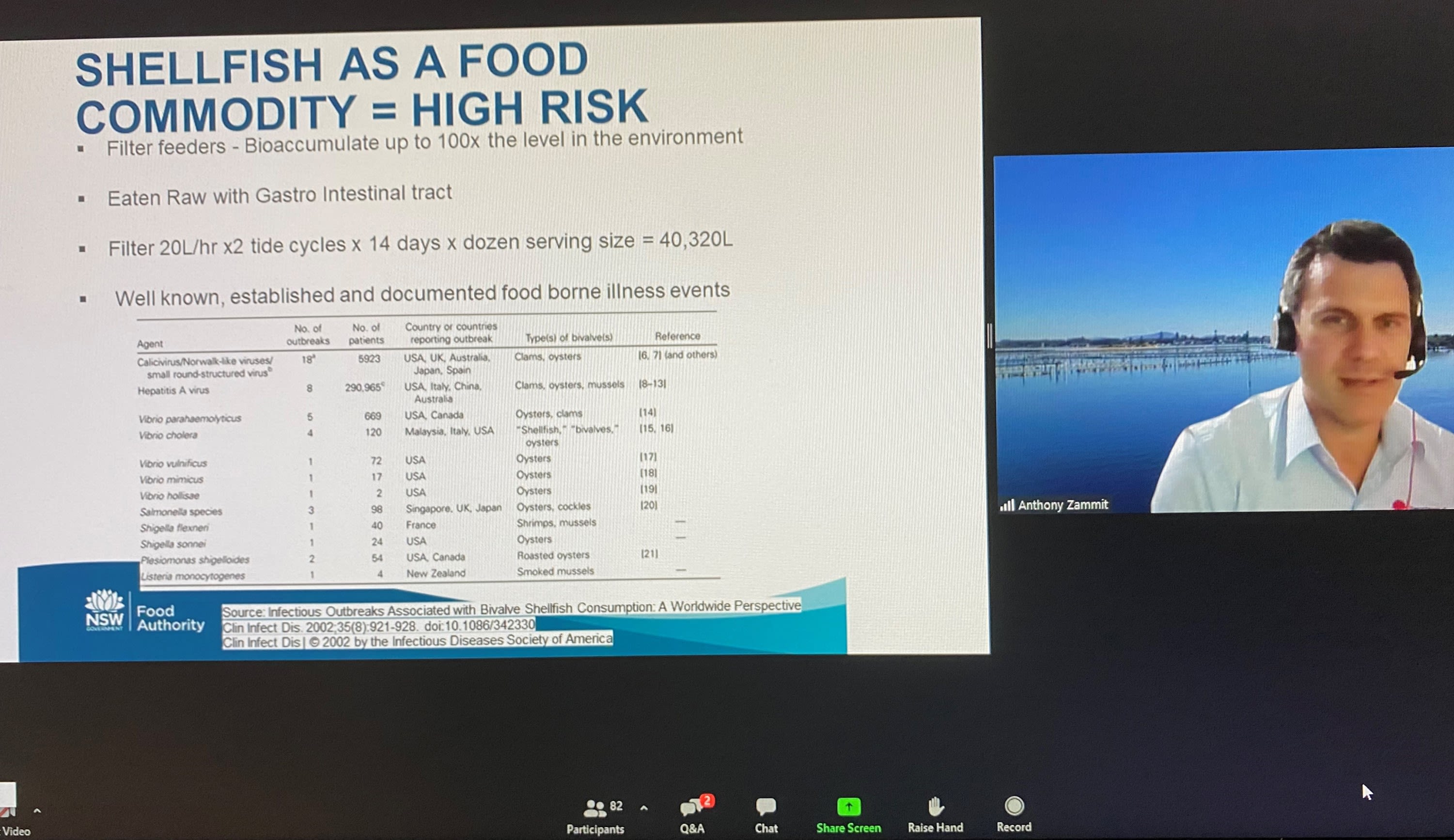
Anthony Zammit, Manager NSW Shellfish Program, NSW Food Authority
Anthony Zammit, Manager NSW Shellfish Program, NSW Food Authority
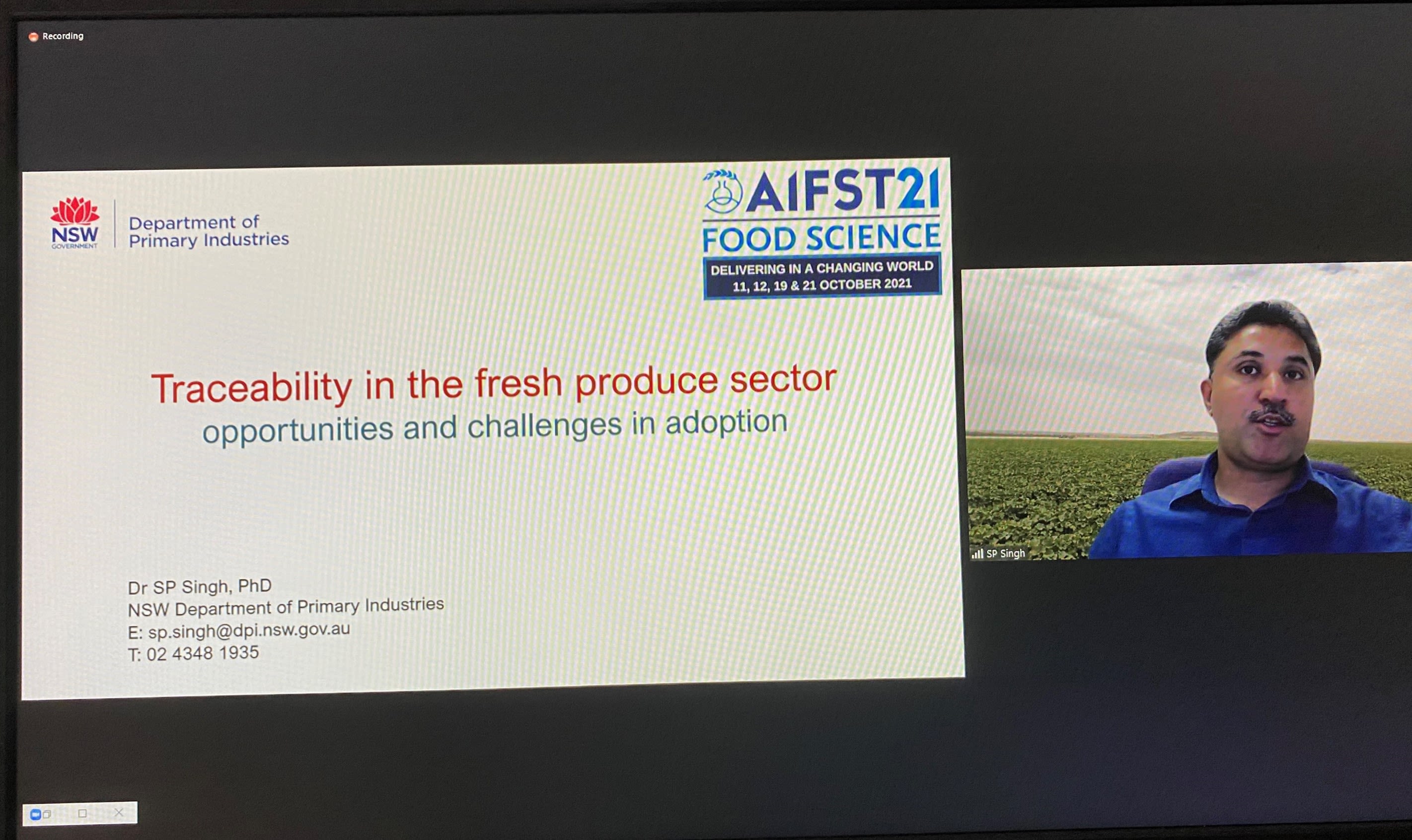
Dr SP Singh, Research Horticulturist, Plant Systems, Department of Primary Industries
Dr SP Singh, Research Horticulturist, Plant Systems, Department of Primary Industries
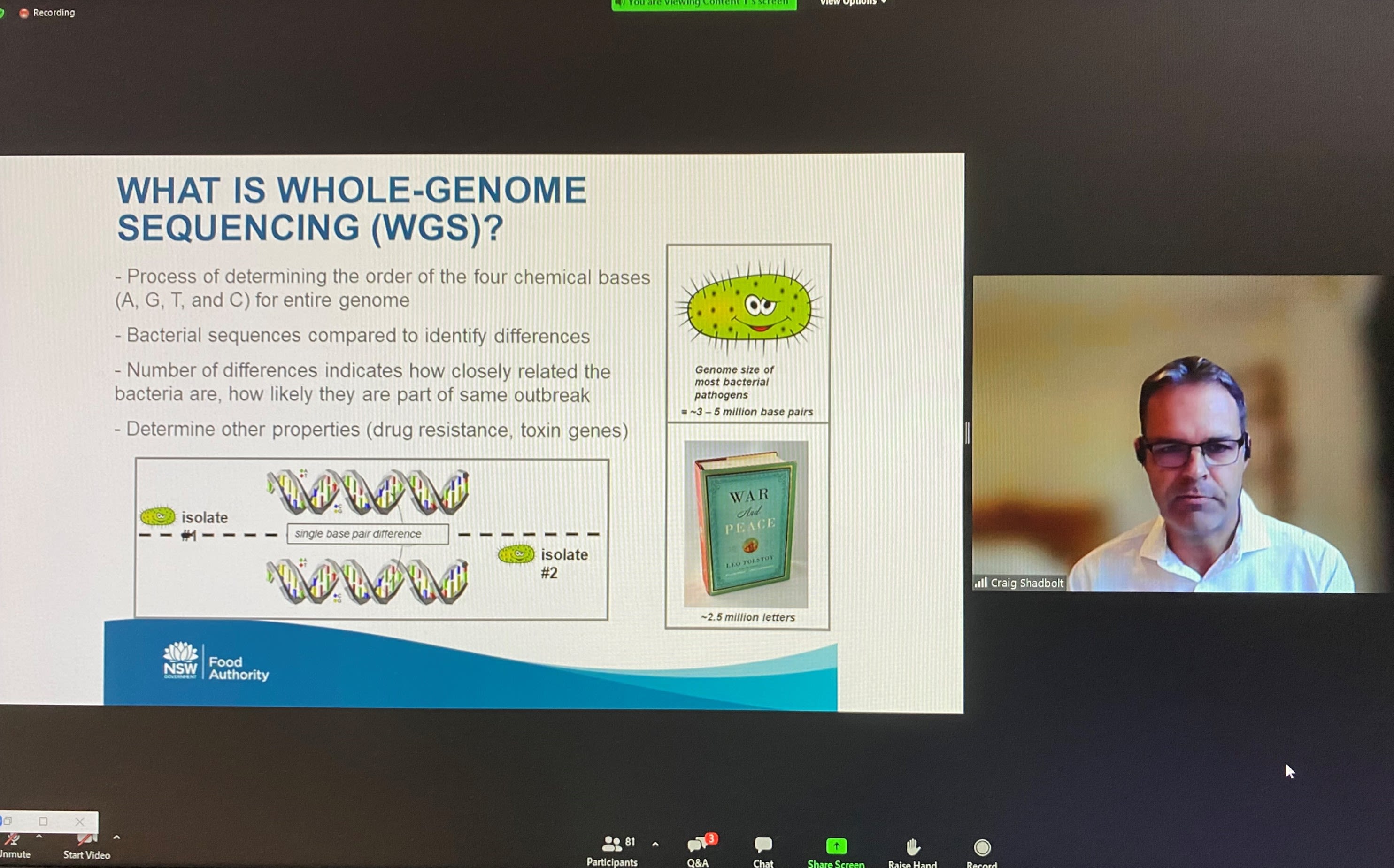
Craig Shadbolt, Principal Food Safety Scientist, NSW Food Authority
Craig Shadbolt, Principal Food Safety Scientist, NSW Food Authority
The NSW Food Authority’s association with excellence in food science, raises greater awareness of our role in evidence-based risk mitigation and policy development, and reinforces the government’s commitment to food safety, confidence and certainty across the supply chain as detailed in the NSW Government Food Safety Strategy 2015-2021.
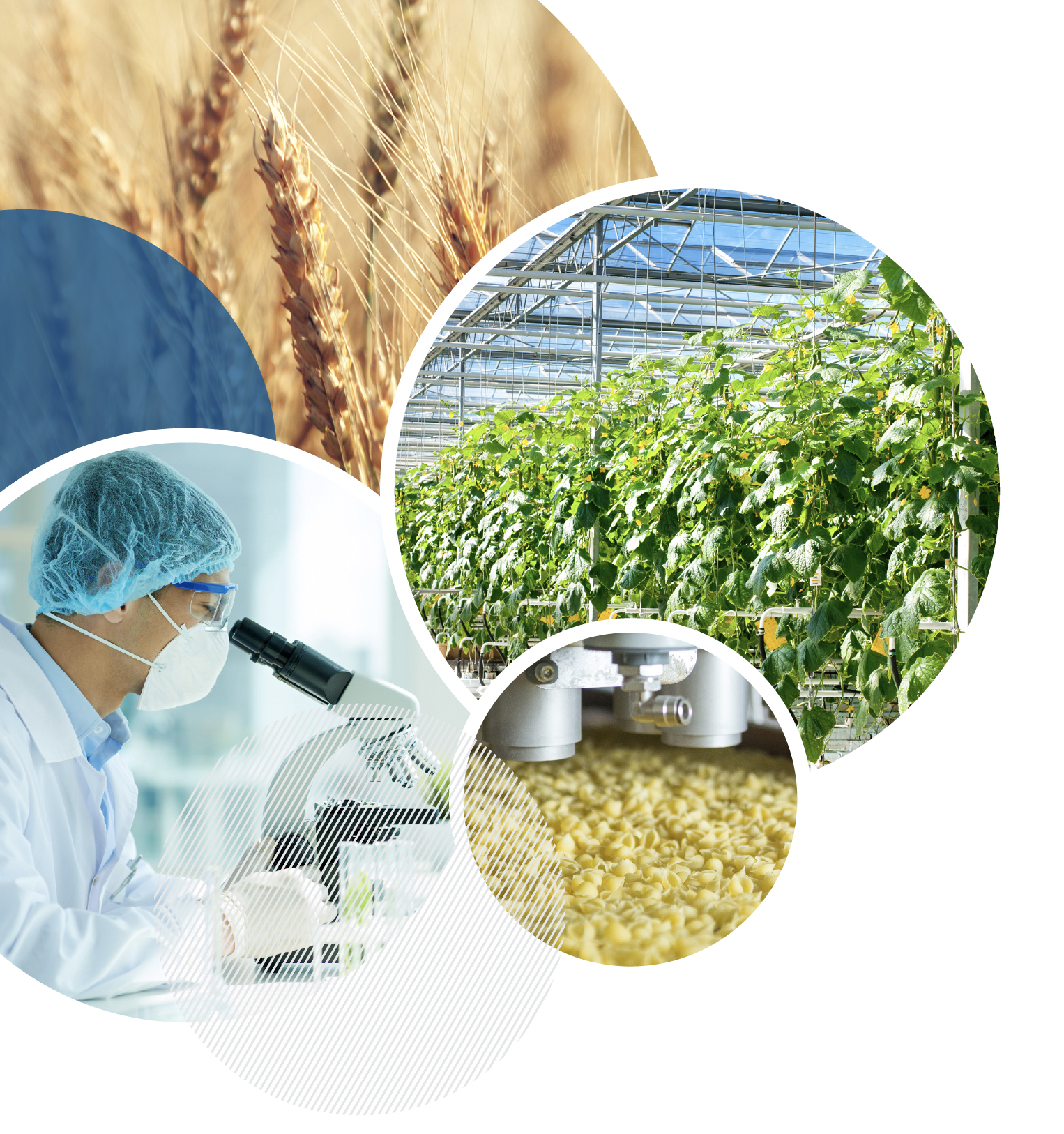
Food Safety Week 2021 – prevent illness by being prepared
The theme for this year’s Australian Food Safety Week was ‘Food safety – be prepared’ with the aim of urging consumers to reduce their risk of food poisoning by being prepared, to build resilience in the community after several natural disasters and a pandemic.
The NSW Food Authority promoted a few simple ways consumers can ensure they are properly prepared to prevent foodborne illness:
- Raw meat and poultry can contain harmful bacteria that can cause food poisoning so be prepared when cooking meat and invest in a food thermometer.
- Cooking meals, putting groceries away and having parties can cause a fridges temperature to stay above safe levels for long periods so ensure your fridge stays 5°C or below with a fridge thermometer.
The best way to be prepared and preventing foodborne illness is by following the golden rules for keeping food safe:
- Keep it cold
- Keep it hot
- Keep it clean
- Check the label
Visit the NSW Food Authority’s Consumer page for more food safety tips.
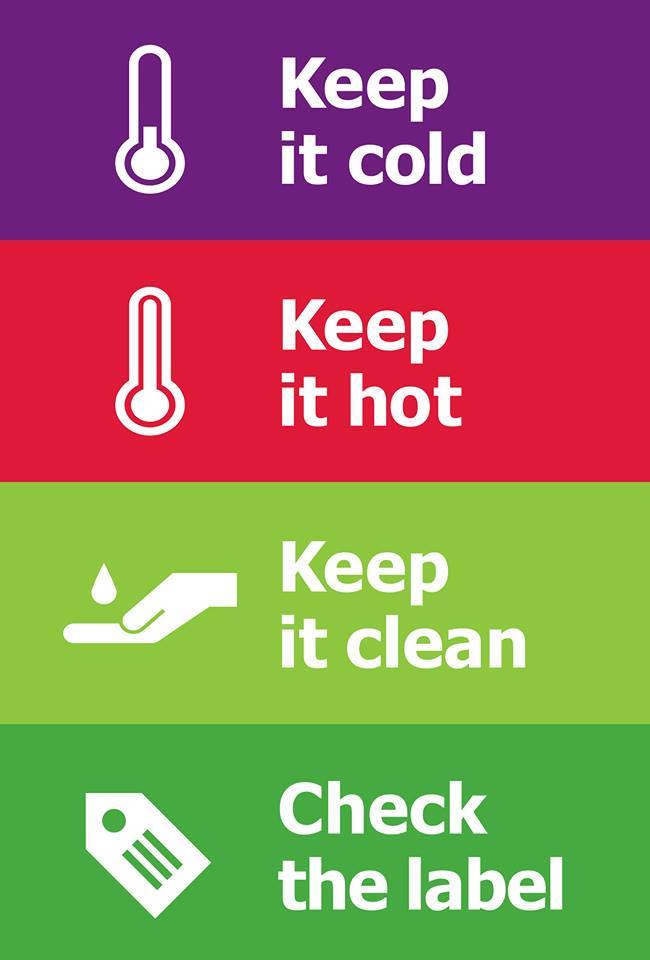
Keep it cold. Keep it hot. Keep it clean. Check the label.
Keep it cold. Keep it hot. Keep it clean. Check the label.
Truth about food poisoning
New food labelling resources for businesses
Do I need a food label? is a new interactive quiz on the Food Authority website for businesses that aren’t sure of the answer. Food labelling is complex and whether a product needs a label depends on several factors. The quiz will complement another new resource coming soon, What do I need on my label?
Do I need a food label? Interactive quiz.
Do I need a food label? Interactive quiz.
What do I need on my food label? will be a step-by-step guide through food labelling requirements designed for small to medium businesses. At the end of the journey, users will be able to download a guide specific to their product.
These new resources will make it easier for small to medium businesses to navigate and understand food labelling requirements for their products.
Feedback is very welcome. Please email food.contact@dpi.nsw.gov.au
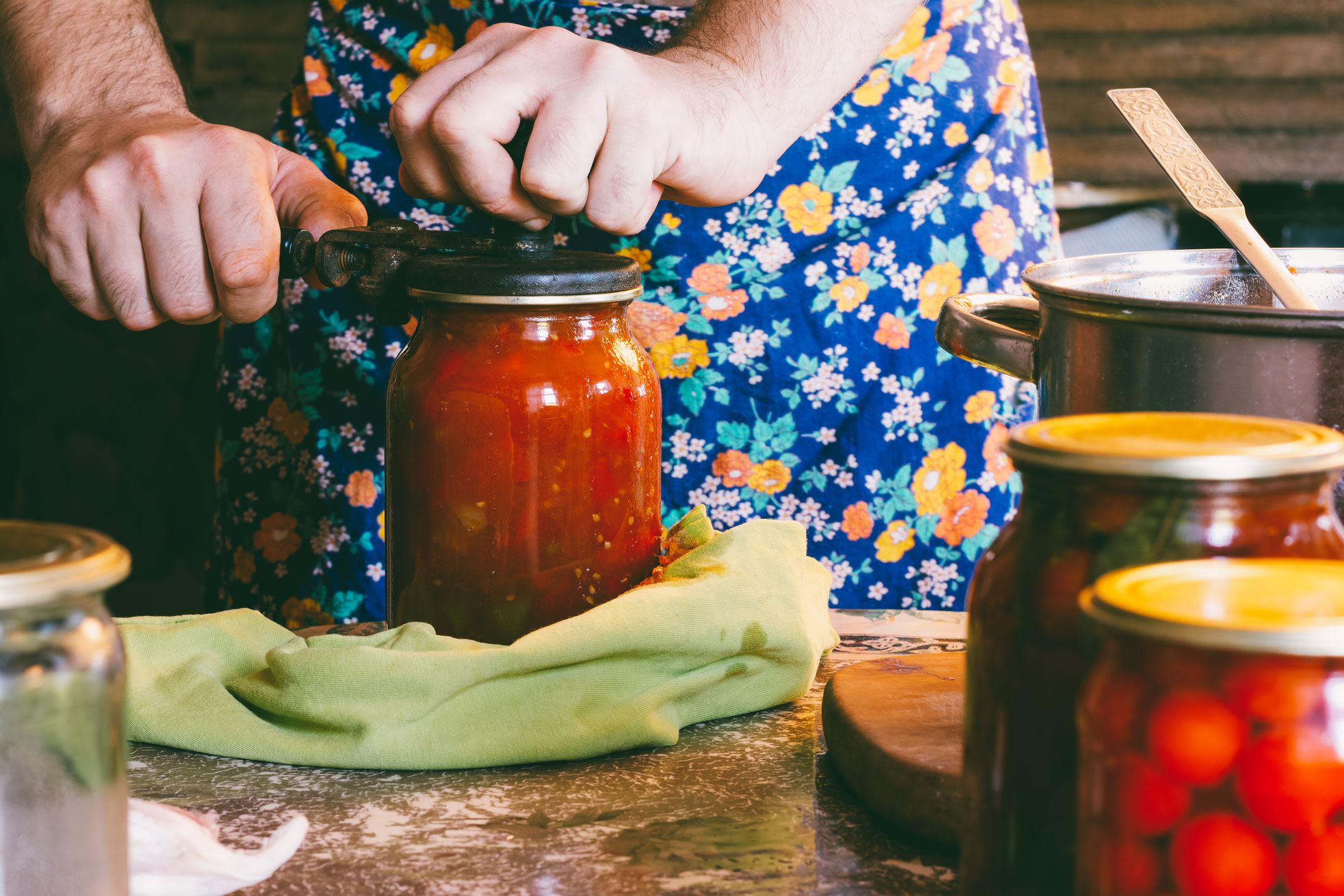
Cheers for the 2021 Sydney Royal Fine Food Show Charcuterie Champions
NSW Food Authority CEO Dr Lisa Szabo has congratulated the Champion Charcuterie winner at the Royal Agricultural Society’s 2021 Sydney Royal Fine Food Show.
Sunshine Meats was awarded the NSW Food Authority supported Champion Other Charcuterie Products Exhibit in the 2021 Sydney Royal Smallgoods & Charcuterie Competition for its smoked duck breast.
The Food Authority’s annual sponsorship of the Royal Agricultural Society of NSW Sydney Royal Fine Food Show is an opportunity for the Food Authority to acknowledge and thank producers in NSW and further afield for their outstanding contribution towards NSW and Australia’s world-renowned food industry.
Dr Szabo said the NSW Food Authority is proud to sponsor an event that promotes excellence and innovation in the fine food industry.
You can view all the Special Prize Winners of the Smallgoods and Charcuterie Competition here
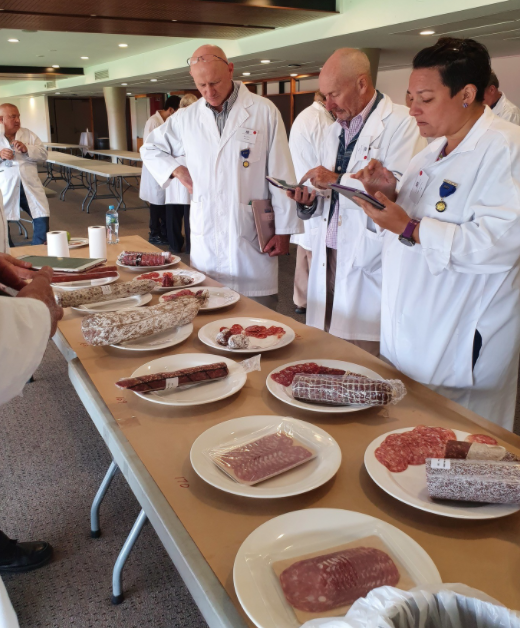
Judging at the 2021 Sydney Royal Smallgoods & Charcuterie Competition.
Judging at the 2021 Sydney Royal Smallgoods & Charcuterie Competition.
Annual Food Testing Report 2020-2021 now available
The NSW Food Authority’s primary objective is to provide consumers in NSW with safe and correctly labelled food.
To support this objective the Food Authority regularly conducts testing of food products to ensure compliance with regulatory requirements, as part of foodborne illness investigations and to gather information to identify and respond to food safety issues. The Food Authority also undertakes scientific surveillance projects to identify and better understand food safety issues and risks in NSW.
The Annual Food Testing Report provides a summary of testing conducted by the Food Authority’s primary testing provider and by other laboratories between July 2020 and June 2021.
The report shows that a total of 2,912 samples were submitted for testing. The number of samples was lower during this period as a result of restriction of movement due to the COVID-19 pandemic. Sample types analysed included meat, seafood, dairy, plant products, packaged food, eggs, food from retail outlets and environmental samples (e.g. swabs). Most samples were submitted for multiple tests which may have included both chemical profiling and microbiological assessment.
Verification programs
Three verification programs were carried out during 2020-2021:
- Food Safety Schemes verification program for ready-to-eat (RTE) products
- Raw poultry verification program
- UCFM verification program
Research and targeted projects
During 2020-2021, the Food Authority conducted several research projects with the aim of gathering information to inform future risk assessment work. Projects included: Mandatory labelling for lupin as an allergen survey, Salmonella Enteritidis (SE) surveillance on egg farms, Salmonella Enteritidis (SE) mandatory testing.
Food safety compliance
Food safety compliance includes several compliance activities, which can result in the analysis of food for a wide variety of tests.
Between July 2020 and June 2021, a total of 2,098 samples were submitted for testing as a result of the following activities and investigations:
- Samples taken during audits and inspections (15 samples)
- Foodborne illness investigations (955 samples)
- Complaints and Compliance projects (1,128 samples)
More detailed information can be found in the Annual Food Testing Report 2020-2021 available on our website.
Keeping food safe in the festive season
Summer and the festive season are about spending quality time with family and friends and enjoying special summer treats such as BBQs and seafood.
This time of year can see a spike in food poisoning incidents as people host meals for larger numbers than they are used to, cooking foods they’re not familiar with and eating outdoors where the warmth of summer can offer the ideal environment for bacteria to grow.
Salmonella is the most common bacteria associated with food poisoning which grows quicker in the warmer months. When large quantities of food are cooked and left out in the open for long periods, food poisoning bugs can spread and multiply. Fridges that are overfilled with leftovers and kept at 5oC or above also pose a risk.
The NSW Food Authority has a food safety guide for summer eating:
- Christmas hams will keep for several weeks with proper handling - see Ham Hints
- Defrosting, cooking, storing and serving turkey can provide bacteria with 4 different opportunities to spoil Christmas cheer - see Turkey tips
- Seafood is a favourite food for many during the warmer months but to avoid food poisoning, seafood needs special care – see Seafood safety
- The average home kitchen isn’t designed for large volume cooking, so good food safety practices can be more challenging – see Family feasts
- Picnics are a way of life for many Australians – see Picnic tips
- BBQs are often the scene of cross-contamination – see BBQ tips
You can also follow these simple tips to make sure your festive season stays festive
Factsheet: Choose food safety this summer
Factsheet: Choose food safety this summer
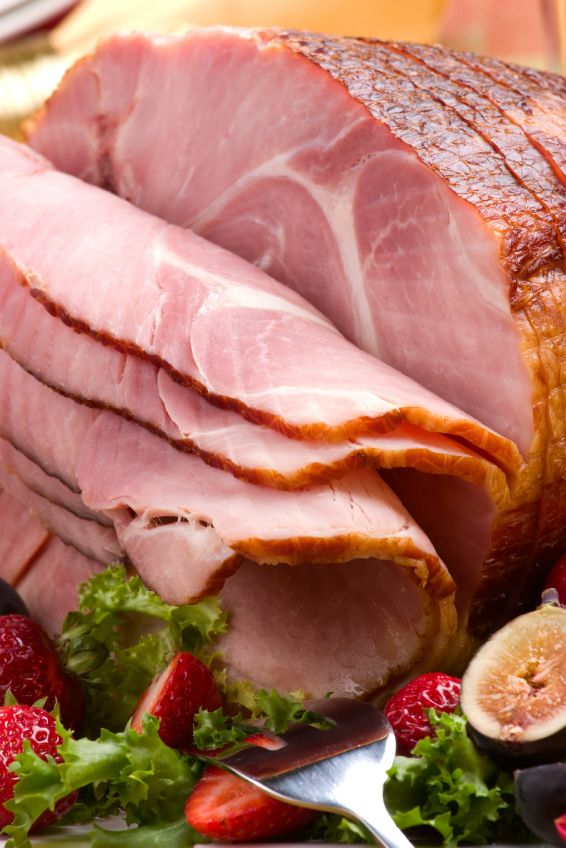
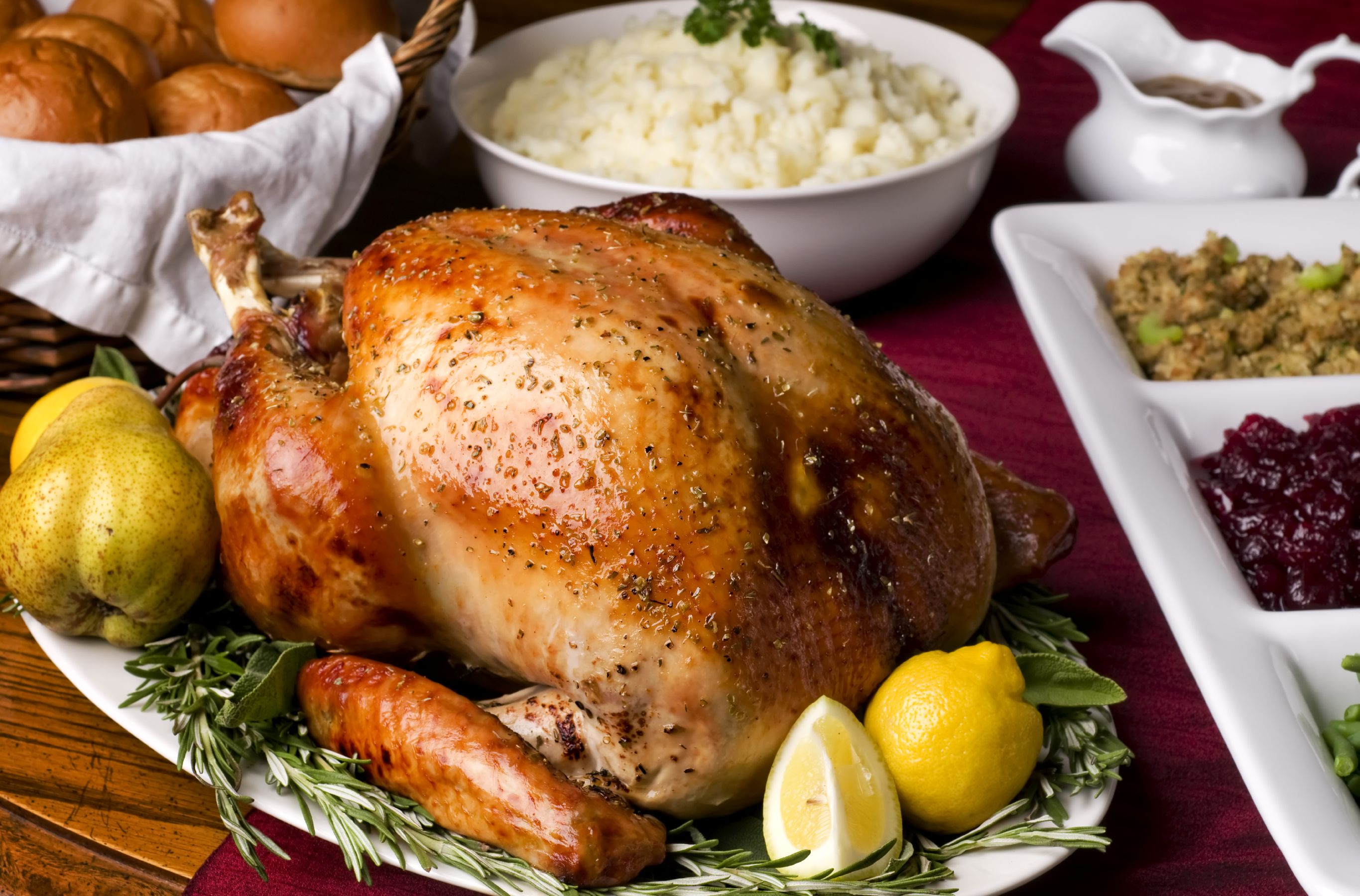
Defrosting, cooking, storing and serving turkey can provide bacteria with 4 different opportunities to spoil Christmas cheer - see Turkey tips
Defrosting, cooking, storing and serving turkey can provide bacteria with 4 different opportunities to spoil Christmas cheer - see Turkey tips
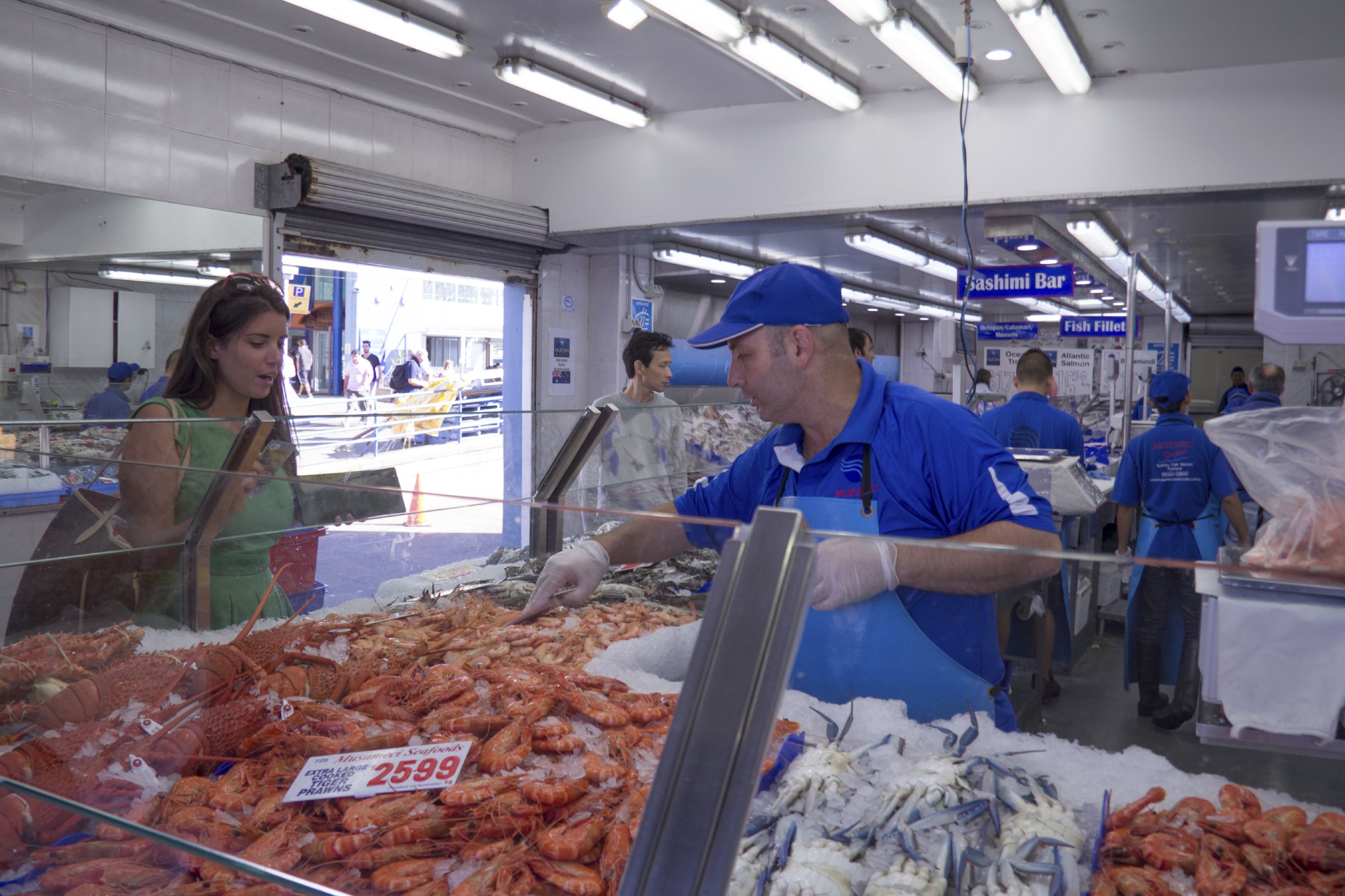
Seafood is a favourite food for many during the warmer months but to avoid food poisoning, seafood needs special care – see Seafood safety
Seafood is a favourite food for many during the warmer months but to avoid food poisoning, seafood needs special care – see Seafood safety
Is it time to refresh your food safety skills?
With retail food premises now open for business in NSW, it’s important to remember that not only are there COVID-19 rules that govern operations, there are requirements that food businesses need to meet to ensure food stays safe.
The Food Act 2003 (NSW) requires certain food businesses in the NSW hospitality and retail food service sector to appoint at least one trained Food Safety Supervisor (FSS) per premises.
The NSW Food Authority’s FSS program provides food safety training to retail food businesses to maintain a skilled and compliant retail food service sector in NSW, and to reduce the incidence of foodborne illness.
The program provides food businesses with high quality and consistent training by a Registered Training Organisation (RTO) that has been approved by the Food Authority.
FSS certificates expire 5 years from the date of issue with the date of expiration printed on each certificate.
Food businesses that have an appointed FSS whose certificate is due to expire will need to enrol them in recertification training with an RTO approved under the FSS program.
Find a Food Authority approved RTO
A person must attain the required units of competency which incorporate the following three key focus areas:
- Safe egg handling
- Allergen management
- Cleaning and sanitising practices
The FSS recertification training will ensure an individual has knowledge of food safety requirements, the skills to manage food safety risks in the workplace and can meet the essential requirements for national units of competency.
Learn about FSS training requirements on the Food Safety Supervisor page. Or you can email us at contact@dpi.nsw.gov.au or phone 1300 552 406.

COVID-19 awareness for food service training
To keep food businesses informed and ensure compliance, the NSW Food Authority developed training and information resources, website information and the voluntary and free ‘COVID-19 awareness for food service’ online training.
‘COVID-19 awareness for food service’ training is available on the Food Authority’s COVID-19 advice webpage.
Over 50,000 certificates have been issued since the training became available in June 2020.
The training is a joint initiative between the NSW Food Authority and NSW Health.
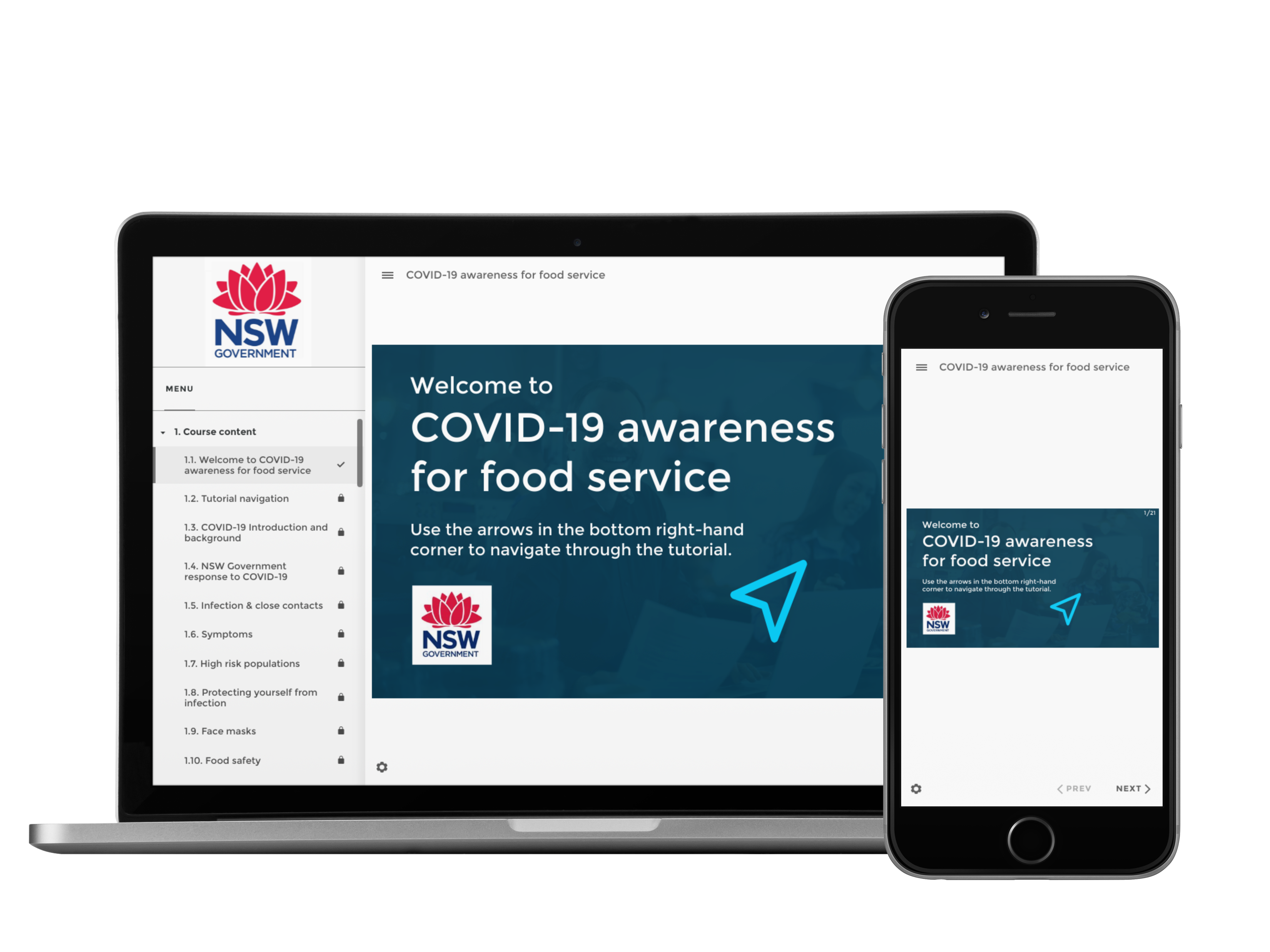
COVID-19 awareness for food service online training.
COVID-19 awareness for food service online training.
RETAIL
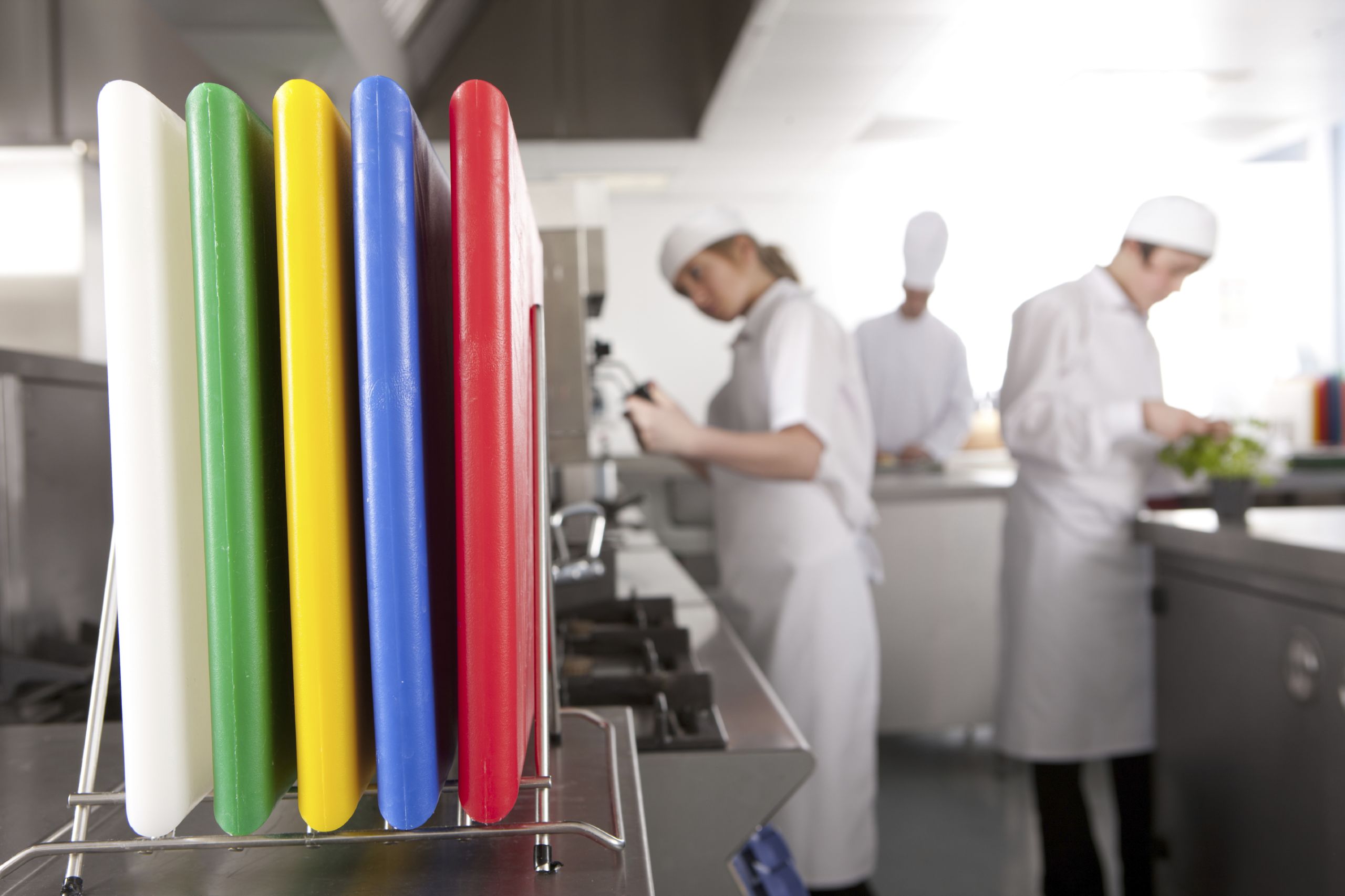
Summary report of NSW enforcement agency activities in the retail food service 1 July 2020 to 30 June 2021
The NSW Food Authority’s Local Government Unit (LGU) has published the annual summary report of enforcement agency activities in the retail food service, showing the sector continues to demonstrate strong food safety outcomes with a 97% compliance rate for the year.
All 128 local councils are appointed enforcement agencies to regulate retail food businesses in their local government area and must provide details about food safety regulatory activities to the NSW Food Authority annually.
Surveillance and enforcement actions
Reports received for the 1 July 2020 to 30 June 2021 period show 479 authorised officers conducted almost 45,000 food safety inspections of the approximately 40,000 fixed retail food premises and 9,000 temporary and mobile food businesses. Interruptions caused by COVID-19 and other events like the recent mouse plague, continued to impact both food businesses and enforcement agencies.
Enforcement agencies reported providing additional support services to retail food businesses, with 92% of agencies providing technical advice, 93% providing food safety information and 32% provided food handler training.
Authorised officers have several enforcement tools if a food business doesn’t comply with food safety standards. Non-compliant food safety matters can be escalated and if significant or recurring, a penalty notice may be issued with the food businesses information published on the NSW Food Authority’s website’s register of offences, also known as ‘Name & Shame’.
The most common food safety breaches under the Food Act 2003 where penalty notices were issued were:
- unclean food premises (15%)
- improper food storage (13%)
- poor handwashing facilities (12%)
- poor pest control (11%)
- unclean fixtures and fittings and equipment (9%).
Agency engagement.
The Food Authority supports enforcement agencies to fulfil their responsibilities by organising engagement events through the Food Regulation Partnership (FRP) and Local Government Unit.
Meetings are held in 16 regions across NSW, three times a year providing opportunities for authorised officers to network and improve skills. Training sessions on ‘Allergen management in the retail sector’, ‘Food labelling’ and ‘Home-based food businesses, temporary event and mobile food vendors’ were run during the year, with most sessions held online due to COVID-19 restrictions.
Information sessions are also held in conjunction with local councils to provide food safety information to food businesses, however only two sessions were held (Bellingen and Maitland) due to COVID-19 restrictions.
The NSW Food Authority continues to work with authorised officers, enforcement agencies, retail food businesses, and the Food Regulation Forum to provide safe food for the people of NSW.
Read the full NSW enforcement agency activities in the retail food service summary report.
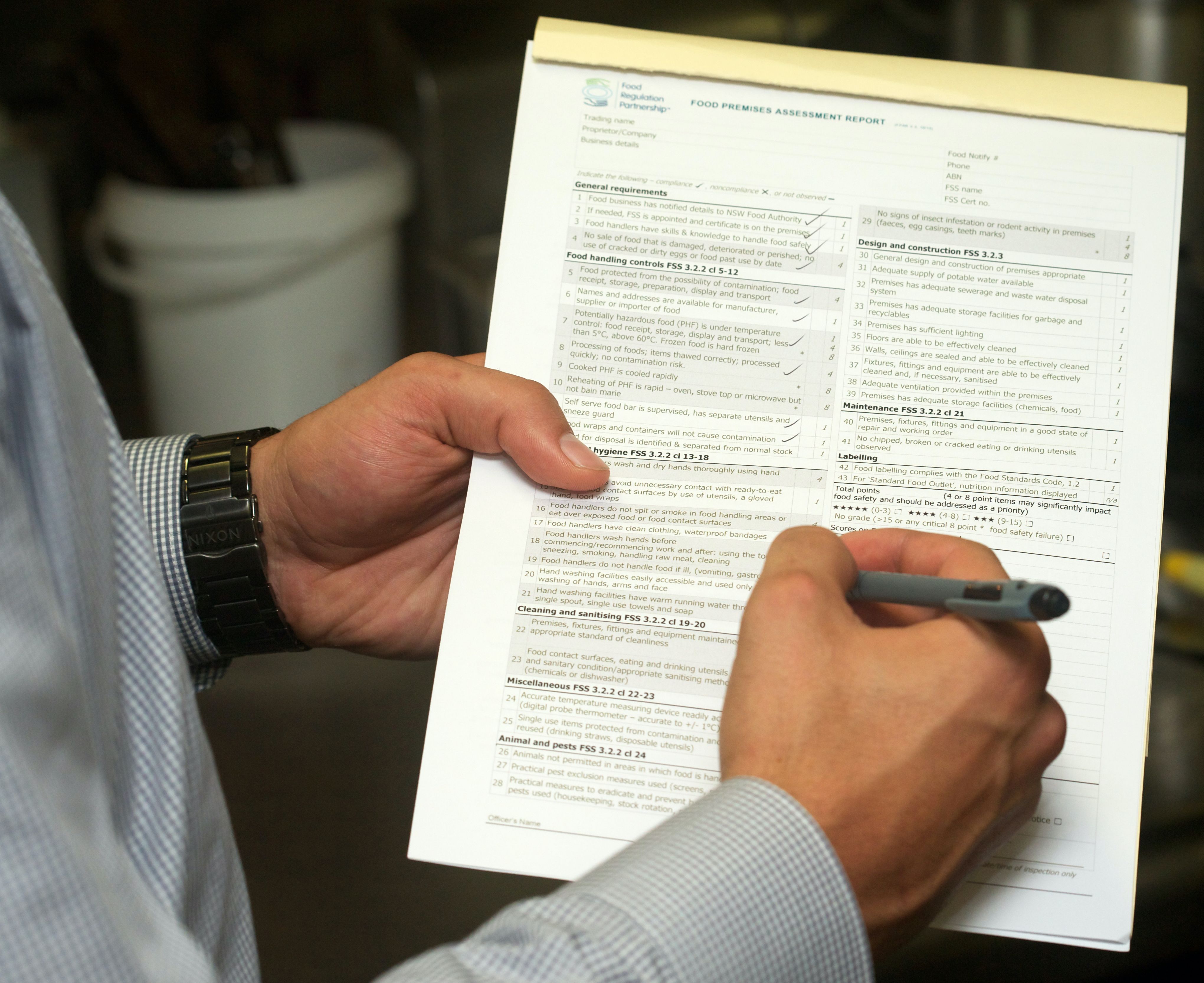
Food safety training for the trainers
On 30 November, the NSW Food Authority hosted its annual RTO Forum which was held online for the second time and attracted a large attendance of 87 trainers and representatives from Registered Training Organisations (RTOs).
Forum topics covered national projects of interest for 2021 including updates to the content in the national units of competency for the hospitality sector and Food Standards Australia New Zealand (FSANZ) Proposal P1053 – Food Safety Management tools. Topics also covered updates to the NSW Food Authority customer service portal for RTOs, projects in the FSS program over the previous 12 months, and an afternoon presentation on Kava regulation which provided an insight into a different area of the Food Authority’s work.
Trainers were keen to hear about changes to hospitality units of competency SITXFSA001 Use hygienic practices for food safety and SITXFSA002 Participate in safe food handling practices. These units form the foundation of a large majority of FSS certificates and have been updated to include trends in food safety risks in the retail and hospitality sector. The new units are likely to be released publicly in early 2022 following consideration by Ministers on the Australian Industry Skills Committee in the near future.
The RTO Forum is a key stakeholder engagement event for the trainers and RTOs who deliver the NSW Food Safety Supervisor (FSS) certificate to learn about trends in retail and hospitality food safety.
The Food Standards and Programs team thanks RTOs for their ongoing engagement to help make the NSW Food Safety Supervisor program a national success in improving the management of food safety risks in the retail and hospitality sector.

MEAT
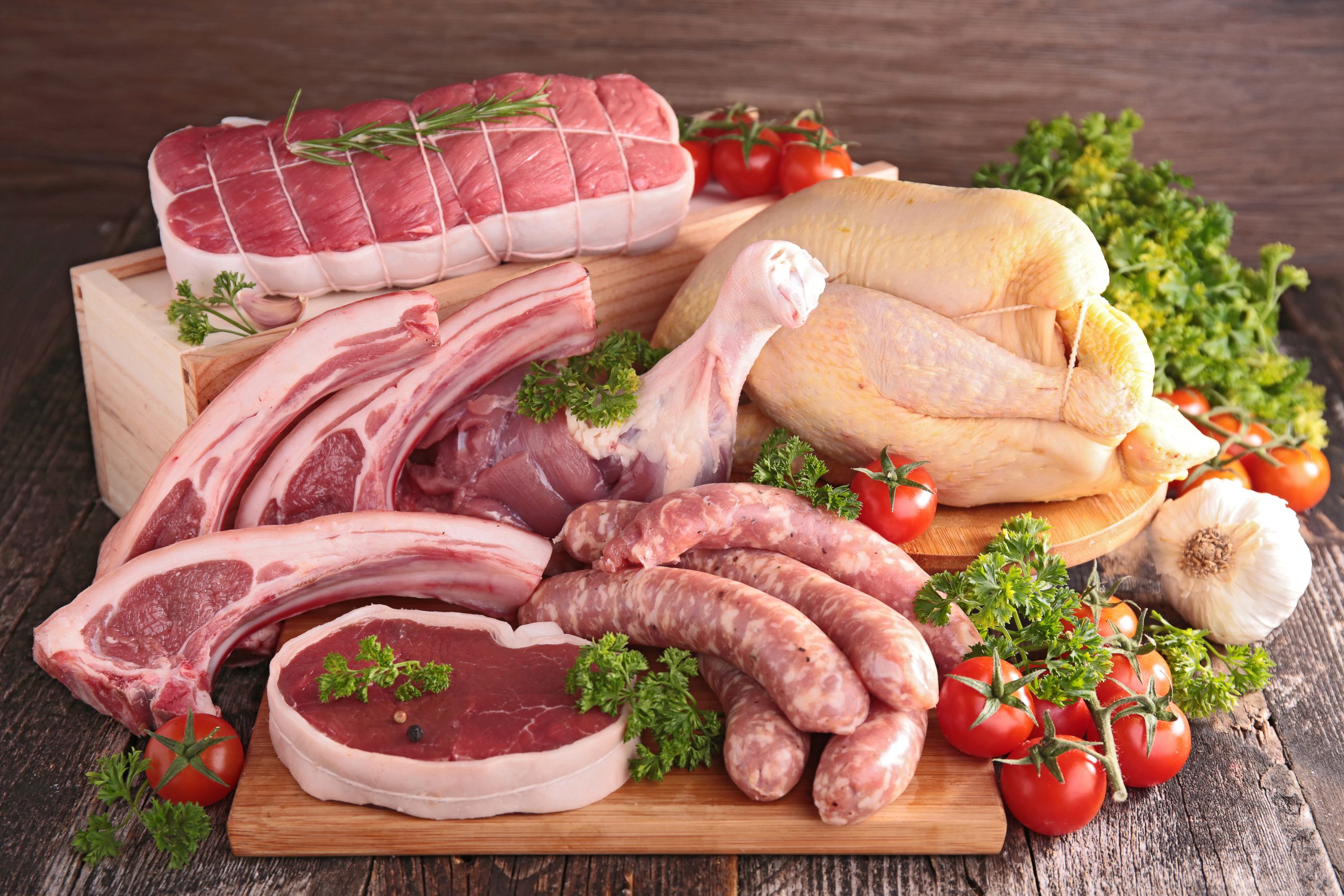
Inspections and audits
From July 2021 to September 2021, the Food Authority conducted 283 inspections and 216 audits of licensed meat businesses. This industry sector has recorded a compliance rate of 97%.
The main audit items attracting Corrective Action Requests (CAR’s) during the period were for Process Control (failure to complete monitoring records or to identify cross contamination risks), Food Safety Program issues, and Analytical Testing.
The table below shows comparable data for compliance and audit activity in the meat sector between the same reporting periods in 2020 and 2021.
| Reporting period | Jul – Sep 2020 | Jul – Sep 2021 |
|---|---|---|
| Total audits | 300 | 216 |
| Total inspections | 311 | 283 |
| Compliance rate | 93% | 97% |
National Livestock Identification System in sheep and goats in NSW – HAVE YOUR SAY!
Charles Sturt University (CSU) researchers are canvassing the views of NSW sheep and goat producers about the National Livestock Identification System (NLIS). The research is examining the barriers and drivers for the implementation of electronic Identification (eID) for sheep and goats in NSW.
The NLIS is Australia’s traceability system to enhance Australia’s position as a safe, high-quality exporter to global red meat markets and to assist in controlling an animal disease outbreak.
The mob-based NLIS system is currently used for identifying and tracing sheep and goats in NSW. It links animals with the properties on which they are born by using visually readable ear tags printed with a Property Identification Code (PIC).
For more than 10 years, the sheep and goat industries in Australia have explored and adopted different methods to improve livestock traceability and eID is one of these methods.
The survey builds on interviews which CSU conducted in August this year with a broad range of stakeholders in the sheep and goat supply chain to get a better understanding of current perspectives on NLIS and the potential impacts of implementing eID within their industries. Information gathered through the interviews and the survey will provide valuable information on how to best improve traceability in these industries in NSW considering perspectives from all relevant stakeholders.
The confidential survey is available online until Friday 10 December and will take about 25 minutes to complete. You can access the survey here.
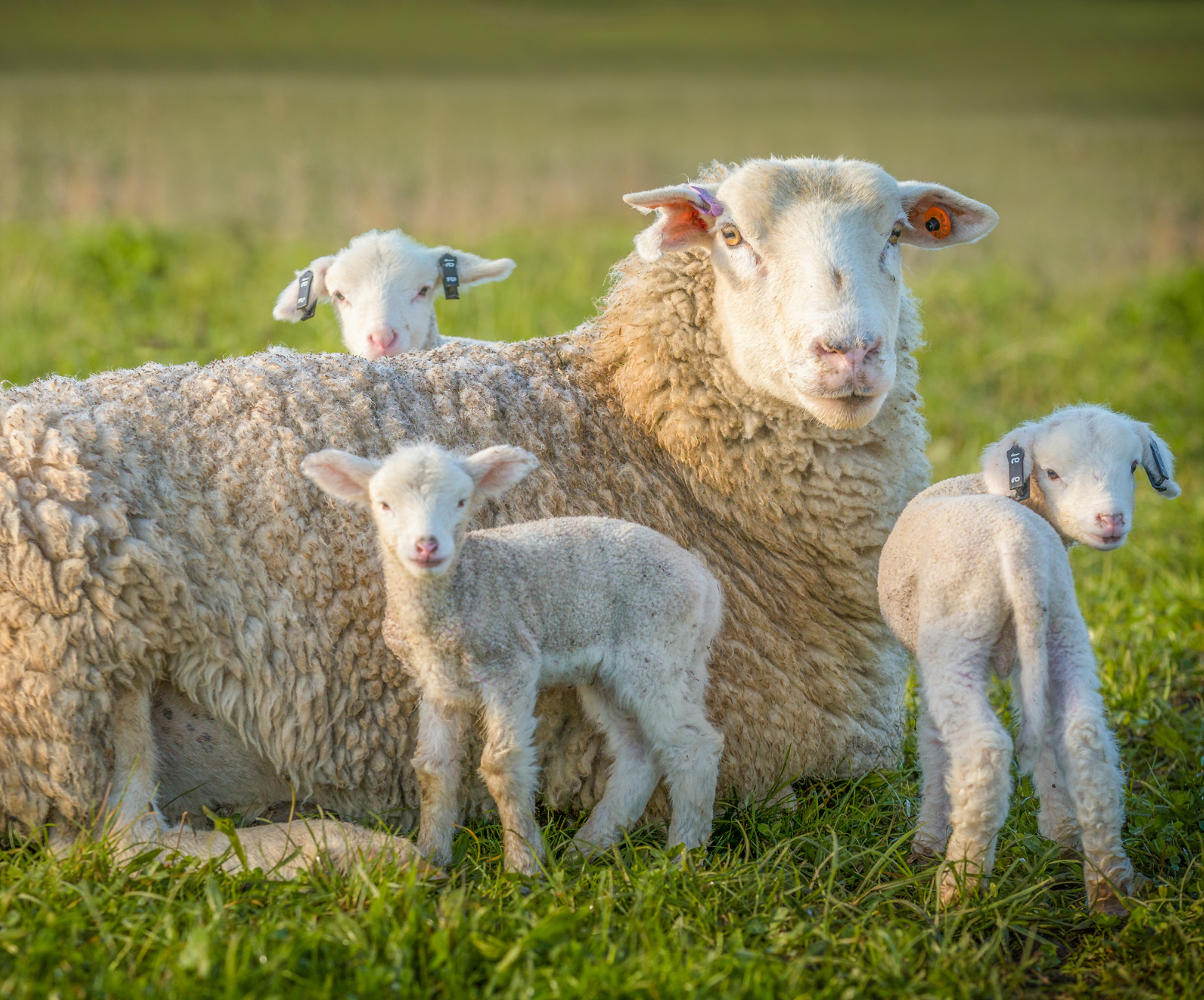
New African swine fever videos
The NSW Department of Primary Industries (DPI) has released a suite of videos featuring Animal Biosecurity Veterinary Officer, Eliz Braddon about African swine fever (ASF), how it spreads and what DPI is doing to prepare for a potential incursion.

Eliz Braddon, Team Leader, Animal Biosecurity
Eliz Braddon, Team Leader, Animal Biosecurity
Shared to the DPI Facebook page, the videos answer questions about the spread of ASF through other countries as well as how swill feeding contributes to the spread of the virus.
Swill feeding is the traditional name for the feeding of food scraps to pigs. Prohibited pig feed (‘swill’) includes meat (raw, cooked or processed), bone, blood, offal or hide derived from a mammal and anything that has come into contact with these materials, such as packaging and take-away containers.
In all Australian states and territories, it is illegal for anyone to feed swill to pigs and to allow pigs access to swill. This includes allowing or directing another person to feed swill to pigs, or to have access to swill.
If you are involved in a food business (e.g. café, restaurant, fast food outlet, hotel, hospital) that produces food waste, or you are involved in the handling, transporting and disposal of food waste you need to know what food materials are permitted to be supplied to livestock owners (especially pig owners) for the purpose of feeding to their animals
Download the Swill Feeding Primefact
SEAFOOD
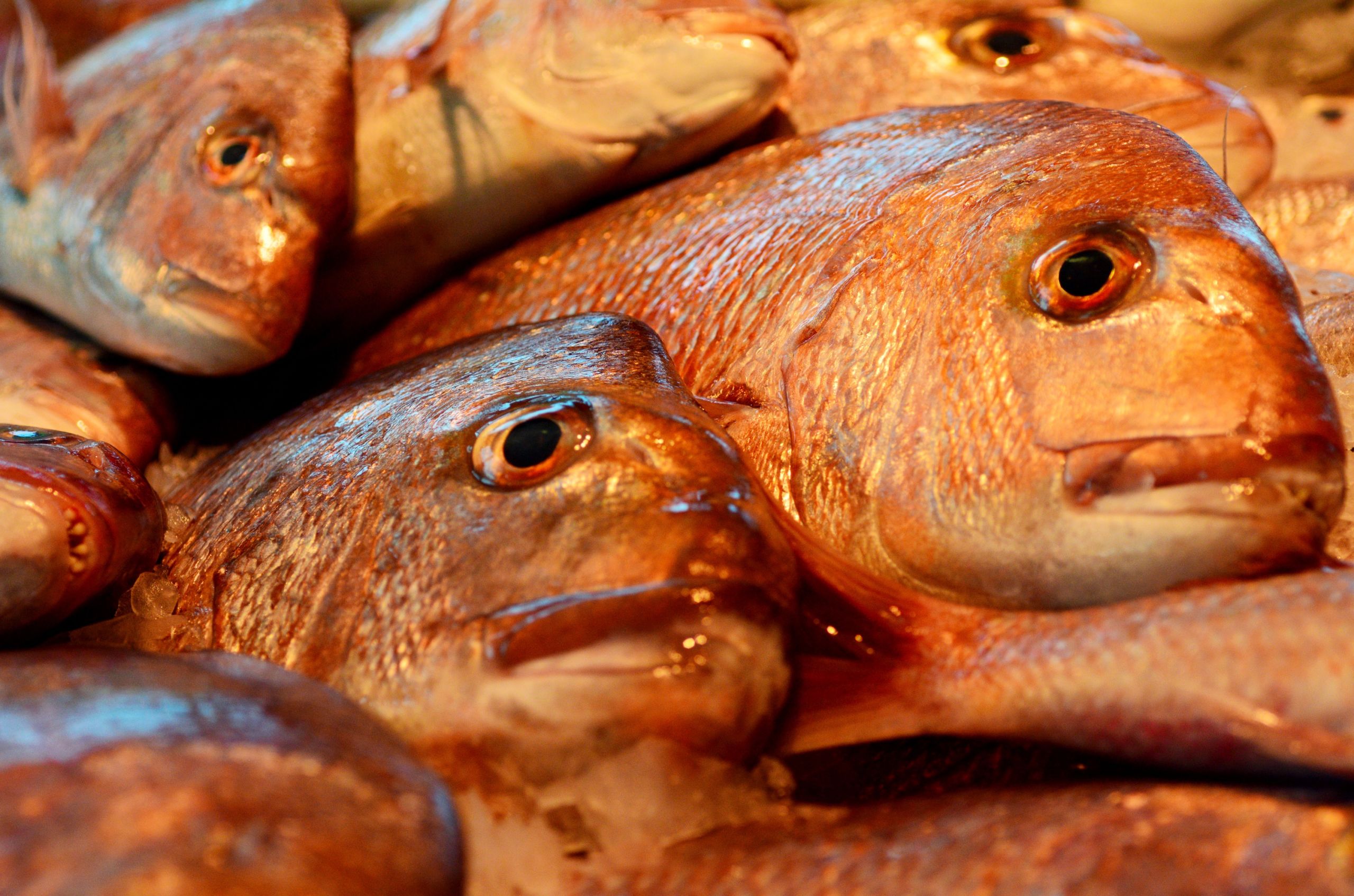
Inspections and audits
From July 2021 to September 2021, the Food Authority conducted 81 inspections and 10 audits of licensed seafood businesses. This industry sector has maintained a high compliance rate of 100% with no serious enforcement actions being taken.
The main areas where critical defects have been raised at audit continue to be with process control, analytical testing, and food safety program monitoring. There have been no consecutive audit failures and the clear majority of defects raised have been rectified immediately which demonstrates that effective corrective actions are being implemented by businesses.
The table below shows yearly comparable data for compliance and audit activity in the seafood sector between the same reporting periods in 2020 and 2021.
| Reporting period | Jul – Sep 2020 | Jul – Sep 2021 |
|---|---|---|
| Total audits | 45 | 10 |
| Total inspections | 108 | 81 |
| Compliance rate | 95% | 100% |
Return to normal business for Shoalhaven and Clyde River oyster farmers
A temporary outward movement restriction on oysters produced in the Clyde and Shoalhaven Rivers was recently lifted allowing farmers to resume trade with producers in other oyster growing areas.
A Control Order on the movement of oysters and equipment to NSW was implemented after the detection of Pacific Oyster Mortality Syndrome (POMS) in Tasmania in 2016. This resulted in a shortfall in available triploid Pacific Oysters produced at a Tasmanian hatchery for cultivation in the Clyde and Shoalhaven rivers.
POMS is a viral disease which affects Pacific Oysters. Infection occurs in the summer months once water temperatures reach and sustain 21 degrees Celsius. Severe impacts persist annually in affected estuaries, which can result in up to 100% mass mortality in cultivated Pacific Oysters. It cannot be transmitted to humans and there are no human health or food safety implications.
NSW DPI implemented a change to the Control Order in 2018, that involved development of a new importation protocol and three-year surveillance program in close consultation with local farmers. This provided for a resumption of supply of Tasmanian hatchery oysters to the Clyde and Shoalhaven rivers, with the surveillance designed to ensure oyster products in these areas were unaffected. The lifting of restrictions came after the final round of the surveillance program in March 2021 found there was no evidence of the disease in the Clyde and Shoalhaven estuaries.
The surveillance program was built into the Control Order as a precautionary measure to validate the Shellfish Hatchery Protocol (the Protocol), that was developed to allow sourcing specially bred triploid Pacific Oysters from a Tasmanian hatchery. The Protocol has strict spat production and importation requirements to safeguard these estuaries against the disease.
All oysters farmed in NSW and destined for sale are harvested under the stringent safeguards of the NSW Shellfish Program administered by the NSW Food Authority
Improvements in administrative processes for permit conditions and associated importation protocols have also been implemented with the lifting of restrictions. Future applications can now be completed quickly and with reduced resource requirements.
Further information about POMS and NSW DPI’s efforts in its management can be found here
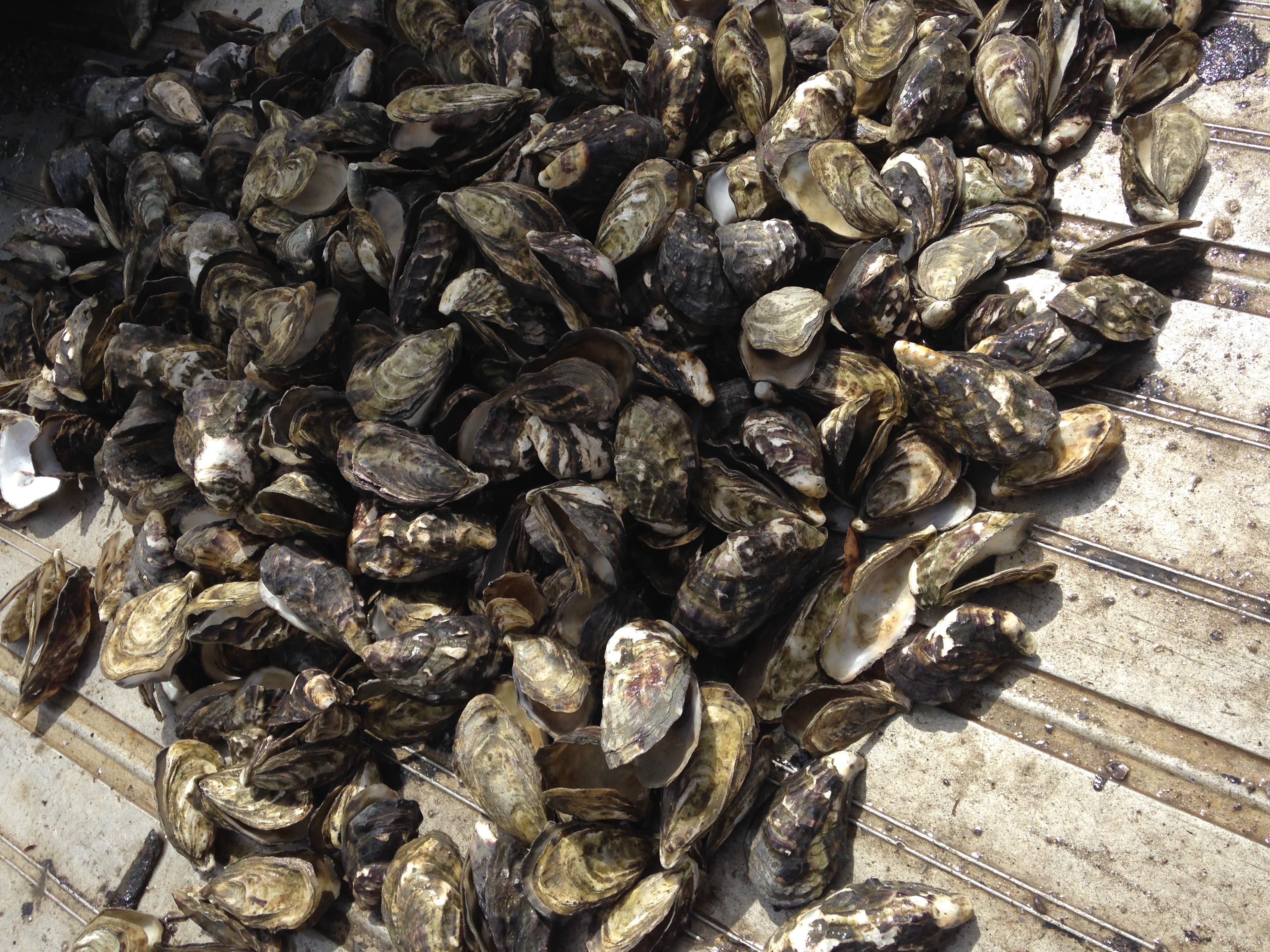
Pacific Oyster Mortality Syndrome (POMS)
Pacific Oyster Mortality Syndrome (POMS)

Pacific Oyster Mortality Syndrome (POMS)
Pacific Oyster Mortality Syndrome (POMS)
Seafood Industry Forum, 15 September
Topics discussed at the latest NSW Seafood Industry Forum, held in Sydney on 15 September, included:
Industry updates
Members provided updates on key and emerging issues in their respective industry sectors including steps to help manage COVID-19 and its impacts. The pandemic has caused some warehouses to be over stocked, causing problems with managing product orders and putting pressure on business logistics.
The Professional Fisherman’s Association has entered a contract with consultants MRAG Asia Pacific to conduct Marine Stewardship Council (MSC) assessments to certify four fisheries (Lobsters, Spanner Crab, Ocean Trap Lines and King Fish).
A Spanish Mackerel Ciguatera project is underway to develop Ciguatera toxin identification kits, with research and development underway. The hope is that Ciguatera toxin identification kits can be developed and used at the Sydney fish markets and eventually for use by fishers.
Training for Handling of Seafood products by Fishers / Delivery Vans
Members discussed the training needs for people entering the fishing sector as there were concerns raised with the underpinning skills and knowledge of this group.
It was agreed DPI will work together with Seafood Industry Forum members to identify and develop a resource to address training needs. It was considered that an online resource would best suit needs with resources supported by social media and infographics on key topics.
Sydney Fish Markets Online Trading System
The Sydney Fish Market presented their enhanced online platforms to bolster sales in lieu of face-to-face trading impacted by COVID-19 lockdowns. The presentation showed the operational logistics of online auction platforms to help buyers make purchases, like ensuring transparency on the number of fish in items to be auctioned prior to the start of bidding. The system proves to be versatile, allowing buyers to select on price, location and availability.
The date for the next meeting of the NSW Seafood Industry Forum is 11 May 2022.
View a full summary of meeting outcomes.
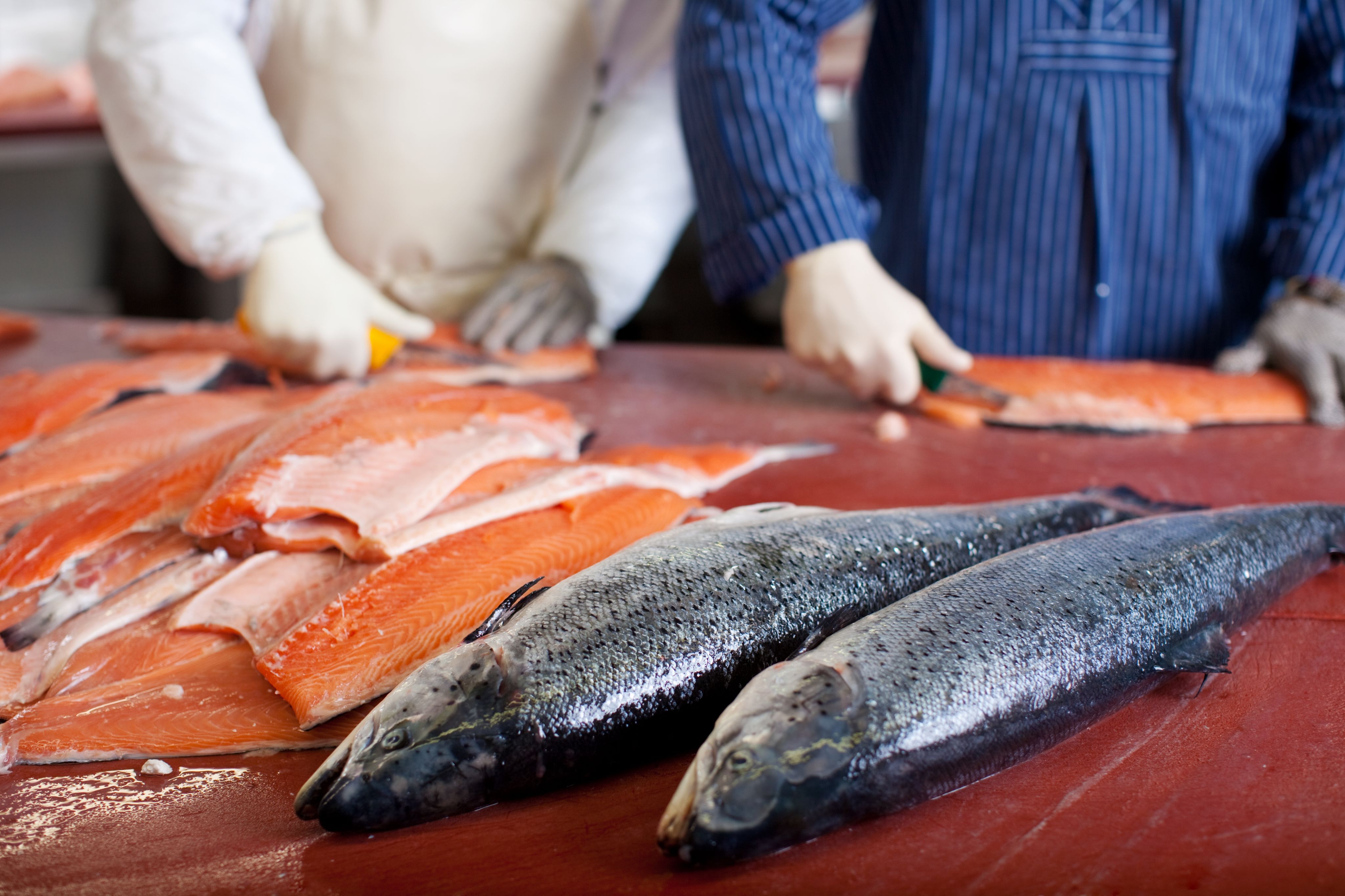
DAIRY
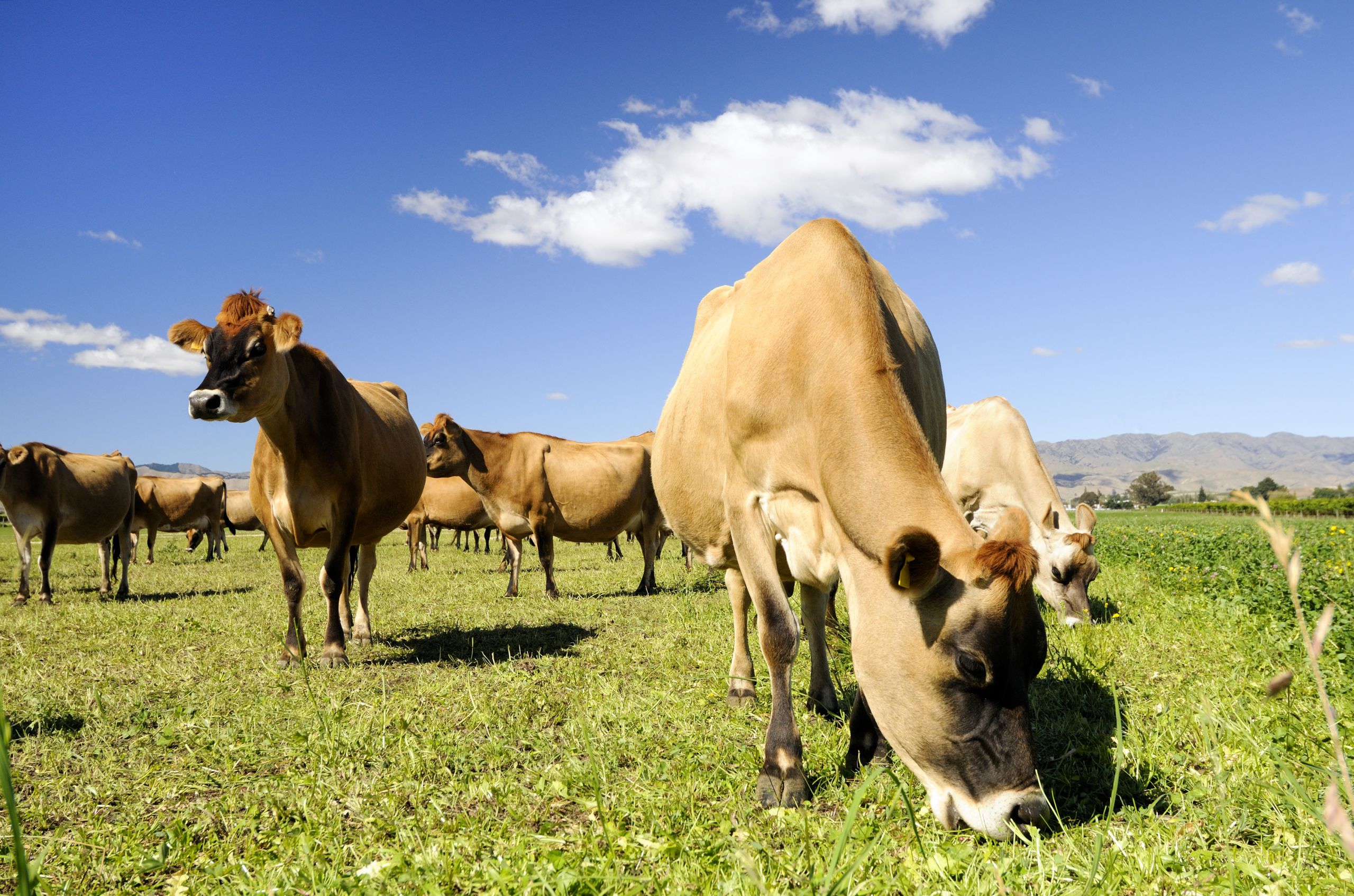
Inspections and audits
From July 2021 to September 2021, the Food Authority conducted 69 inspections and 91 audits of licensed dairy businesses. This industry sector has maintained a high compliance rate with 100% of businesses recording an acceptable audit result. This industry sector has maintained a high compliance rate for an extended period due to industry commitment to food safety controls.
There were no serious enforcement actions taken against licensed dairy business during this period.
The table below shows yearly comparable data for compliance and audit activity in the dairy sector between the same reporting periods in 2020 and 2021.
| Reporting period | Jul – Sep 2020 | Jul – Sep 2021 |
|---|---|---|
| Total audits | 49 | 91 |
| Total inspections | 90 | 69 |
| Compliance rate | 99% | 100% |
New Food Safety Program template for small dairy processors
The NSW Food Authority has published a Food Safety Program (FSP) manual that provides information and guidance helping small dairy processors meet their regulatory requirements under the Food Act 2003.
The Food Safety Program for Small Dairy Processors has been developed to identify and control risks in the pasteurisation of raw milk as well as guidance information for the production of yoghurt, cheese, ice cream/gelato, cream, butter and sour cream.
Small dairy processors must follow the manual to develop and implement a documented food safety program to fit their business and product requirements and ensure that all potential food safety hazards are identified and controlled.
Food businesses should keep a record and retain copies of action taken demonstrating compliance with the food safety program and ensure it is audited by a food safety auditor.
A copy of the manual and appropriate records must be made available to the food safety auditor when requested. All written reports of all food safety audit results for the previous 4 years should also be retained so they can be inspected by a food safety auditor or authorised officer when requested.
Small dairy processors are guided through the requirements for safely pastuerising milk as well as support program information for construction and maintenance of processing equipment, cleaning and sanitising, pest control, testing, and labelling and allergen requirements. A list of forms that small dairy processors should complete are also available at the end of the manual.
Guidance information in the manual covers purchase and receival of raw milk through to processing of products and distribution of finished products to retail outlets. The manual covers production guidance on the following products:
- Milk
- Dairy-based desserts and dips
- Ice creams and edible ices
- Yoghurt
- Sour cream
- Cheese
- Cream
- Butter
- Dried milk powder
Download a copy of the Food Safety Program for Small Dairy Processors

Dairy Industry Consultative Committee
Issues considered by the Committee on 20 October included:
Members provided updates on key and emerging issues/concerns in their respective industry sectors. Industry expressed their relief now NSW is again opening after a long COVID-19 lockdown, however there are still concerns over shortages of suitably trained and skilled staff making it hard for industry to return to pre-pandemic trading levels.
Bobby Calf Welfare Saleyard Signage
A paper was presented to Members on measures taken to improve livestock welfare at saleyards. The NSW Department of Primary Industries (DPI) Animal Welfare Unit collaborated with Local Land Services (LLS) and Dairy Australia to develop three saleyard signs which informs people who transport or sell bobby calves about appropriate handling and relevant welfare legislation
The signs are endorsed by 11 agencies and industry bodies and were distributed by LLS to saleyards across NSW.
International Engagement Update
Members were informed DPI’s international engagement function is moving to Investment NSW, which will continue working with DPI to identify sectors needing support.
Members were also updated on The Going Global Program run by Investment NSW and funded by the NSW Government, which supports the objectives of Global NSW by building export success amongst the State's businesses. Going Global provides a holistic program of assistance, designed specifically for businesses to expand internationally in key markets.
View a full summary of meeting outcomes.
The next scheduled meeting of the NSW Dairy Industry Consultative Committee is 15 June 2022. Further out of session meetings will be scheduled if required to deal with urgent matters such as COVID-19.
EGGS
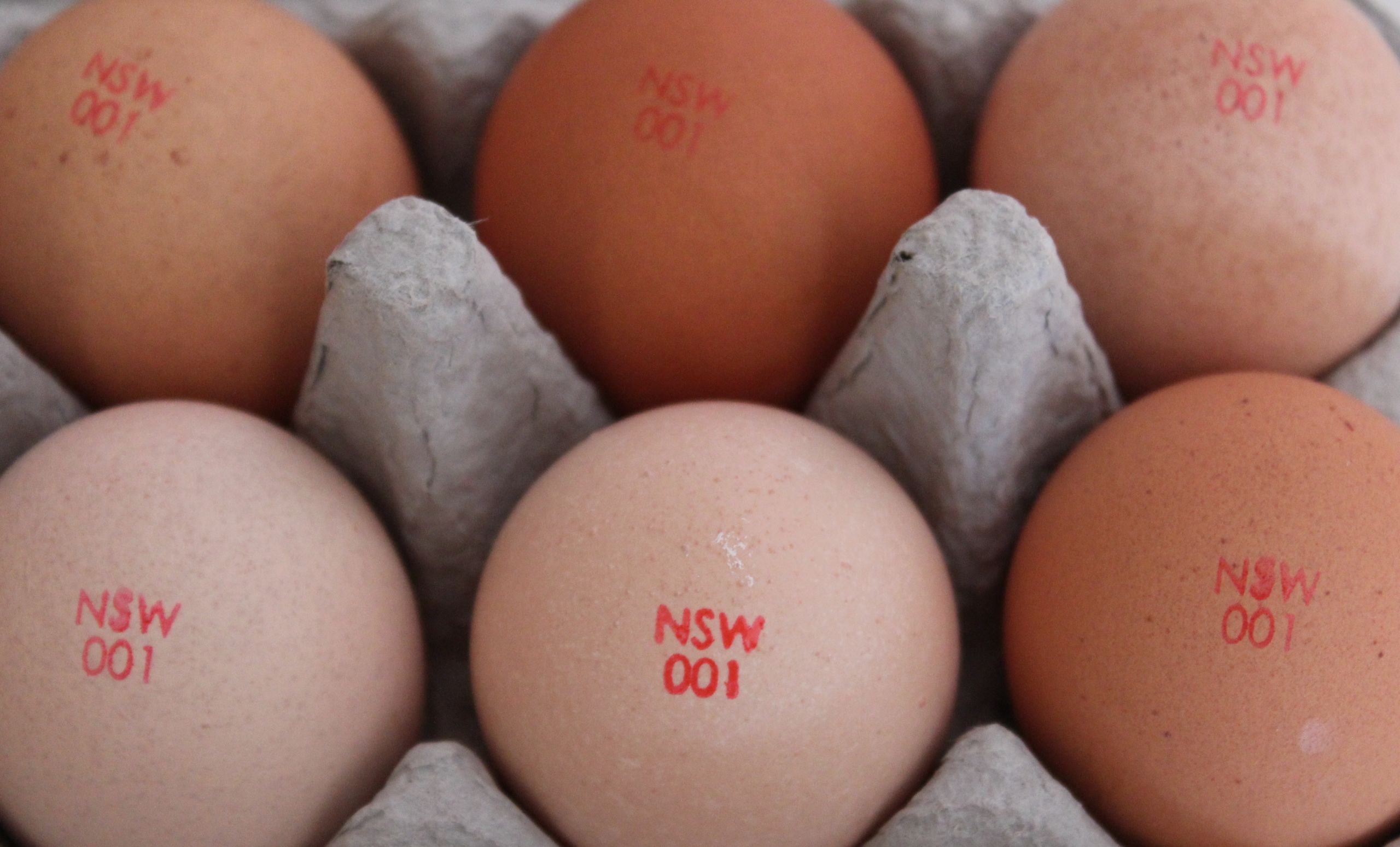
Inspections and audits
From July 2021 to September 2021, the Food Authority conducted 45 inspections and 17 audits of licensed egg businesses. This industry sector has recorded a compliance rate of 93% for the reporting period.
The table below shows yearly comparable data for compliance and audit activity in the egg sector between the same reporting periods in 2020 and 2021.
| Reporting period | Jul – Sep 2020 | Jul – Sep 2021 |
|---|---|---|
| Total audits | 20 | 17 |
| Total inspections | 62 | 45 |
| Compliance rate | 83% | 93% |
Bird biosecurity for keeping backyard chooks
Regardless of whether you’re a commercial producer, or only keep a few chickens in your backyard, you need biosecurity practices in place to protect not only your birds from disease, but also your family from illness.
Many people purchase chickens as pets and to have a few laying hens. There are simple steps you can take to ensure your hens are happy and healthy, and to reduce the chance of pests and diseases entering or spreading among your chickens.
- Before purchasing chickens, check your local council requirements
- Implementing good hygiene and biosecurity can help safeguard against unwanted diseases, some of which affect both people and chickens.
- Always wash your hands after handling chickens or eggs
- Poultry housing hygiene is critical - nesting, roosting areas and enclosures should be sanitised regularly
- Don’t let feed and water become contaminated by faeces or other waste products
- Avoid visiting places with other birds if you have your own hens as this could facilitate the movement of diseases between flocks
- Avoid contact between your chickens and wild birds by restricting access to open ponds, lakes and creeks as water birds are known carriers of disease. Use protective netting to protect domestic bird areas.
- Limit visitors to your chickens or ask visitors to wear clean boots and clothing or provide personal protective equipment.
- Quarantine new chickens - separate and monitor new chickens for at least 30 days before introducing them to your existing flock, and always source chickens from a reputable producer or breeder.
- Prior to purchase, check which vaccinations the chickens have received. Then, in consultation with your private veterinarian, maintain a vaccination program to keep your chickens healthy.
- Know the signs of disease which can include, but is not limited to swollen heads, dullness, drop in egg production, respiratory distress, diarrhoea, loss of appetite, sudden death or several or more birds.
Salmonella Enteritidis
Salmonella is a bacteria commonly found in animals, including chickens. It can cause serious illness to humans such as gastroenteritis when contaminated food is consumed.
Salmonella Enteritidis (SE) is a type of Salmonella that is present in most international egg industries. Salmonellosis is one of the most common and widely distributed foodborne diseases. It is high-risk for causing illness in people and can be particularly severe for people over the age of 70, young children, and those with weakened immune systems.
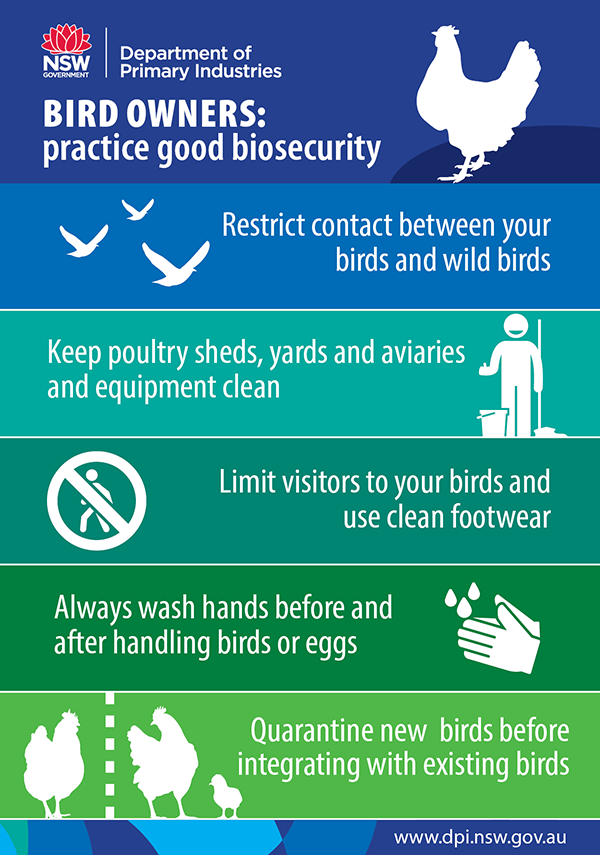
Bird owners: practice good biosecurity
Bird owners: practice good biosecurity
SE can spread from property to property through the movement of birds (chickens), eggs, manure, produce, equipment, feed, rodents, people and vehicles.
Click on the links below for more information on bird biosecurity and how to handle eggs safely so you don’t become ill.
- NSW Food Authority - Egg safety tips
- NSW Department of Primary Industries – Poultry planning and keeping
- Local Land Services – Livestock and Poultry
- Australian Eggs
- Egg Farmers of Australia
If you see any unusual symptoms in your chickens or find that a number of them have died within a short period of time, be on the safe side and report it immediately to your local private veterinarian, your Local Land Services District Veterinarian or the Emergency Animal Disease Hotline on 1800 675 888.
PLANTS

Inspections and audits
From July 2021 to September 2021, the Food Authority conducted 21 inspections and 13 audits of licensed plant product businesses. This industry sector has recorded a compliance rate of 100%.
The table below shows yearly comparable data for compliance and audit activity in the plant sector between the same reporting periods in 2020 and 2021.
| Reporting period | Jul – Sep 2020 | Jul – Sep 2021 |
|---|---|---|
| Total audits | 17 | 13 |
| Total inspections | 43 | 21 |
| Compliance rate | 95% | 100% |
Food Defence for the Fresh Produce Industry
The Fresh Produce Safety Centre has just released a new fact sheet on food defence for the fresh produce industries of Australia and New Zealand.
The fact sheet provides the fresh produce industry with practical advice and guidance. It aims to help growers, packers, and processors in Australia and New Zealand determine an appropriate and relevant approach to food defence, tailored to their business.
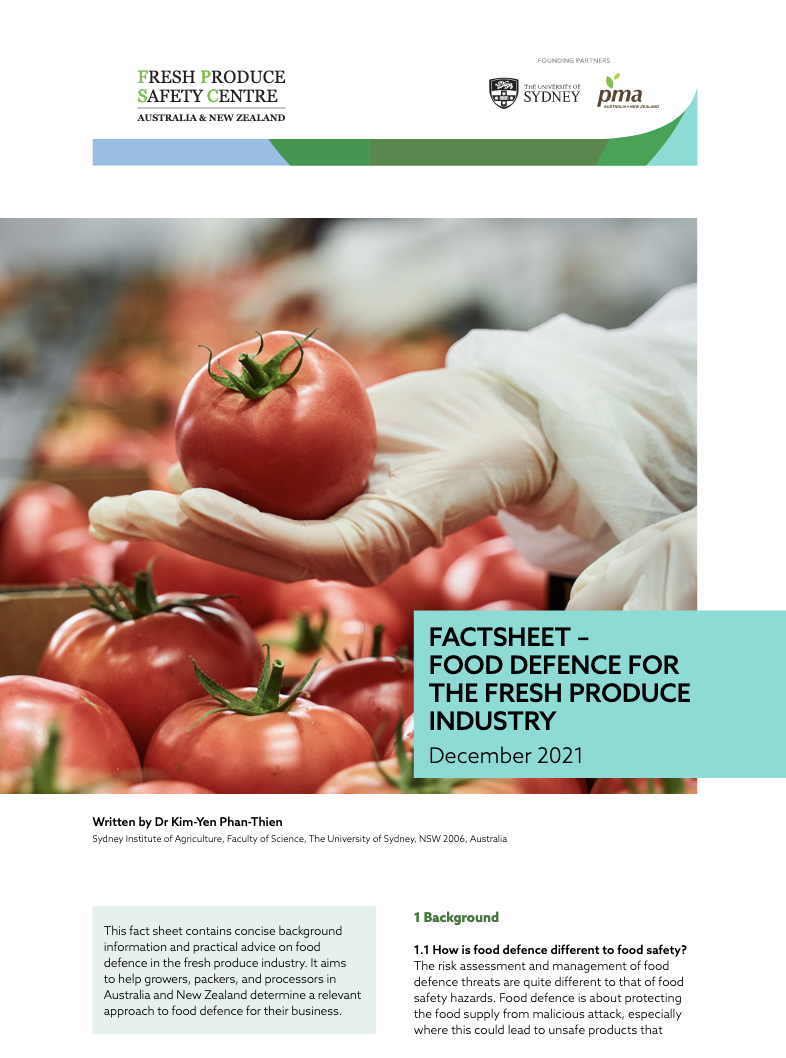
Factsheet: Food defence for the fresh produce industry
Factsheet: Food defence for the fresh produce industry
Food defence is about protecting the food supply from malicious attack, especially where this could lead to unsafe products that cause public harm.
Malicious (intentional) contamination is a particular concern for industry and governments because such incidents can compromise the safety of food and place public health at risk. Food defence is relevant for food businesses at all stages of the supply chain – including growing, packing, and processing of fresh produce.
You can view the fact sheet, Food Defence for The Fresh Produce Industry here
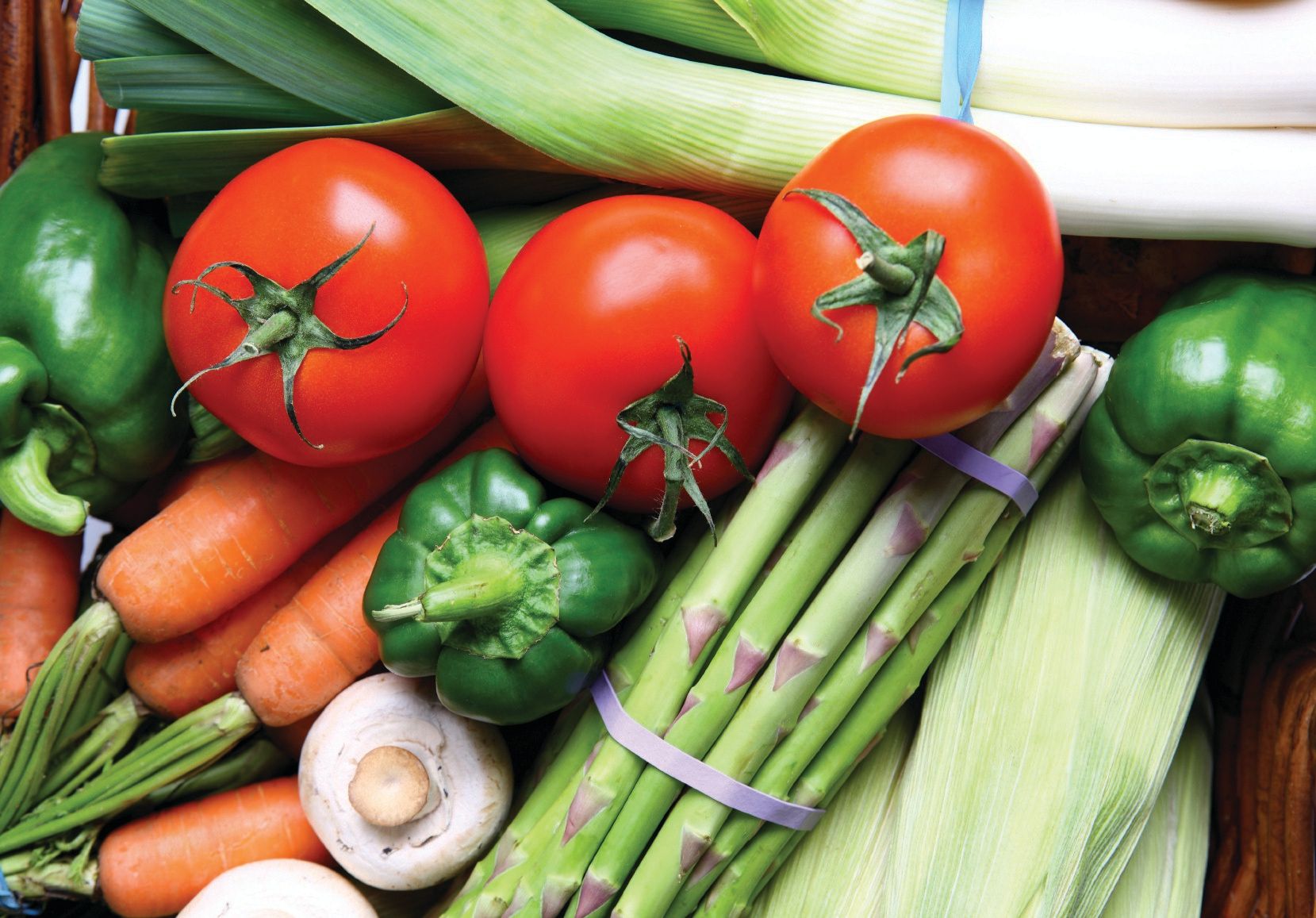
VULNERABLE PERSONS

Inspections and audits
From July 2021 to September 2021, the Food Authority conducted 14 inspections and 353 audits of licensed hospitals and aged care businesses. This industry sector has maintained a high compliance rate with 100% of businesses recording an acceptable compliance result due to the correct implementation of food safety controls and ensuring staff have the necessary skills and knowledge.
The table below shows yearly comparable data for compliance and audit activity in the vulnerable persons sector between the same reporting periods in 2020 and 2021.
| Reporting period | Jul – Sep 2020 | Jul – Sep 2021 |
|---|---|---|
| Total audits | 453 | 353 |
| Total inspections | 23 | 14 |
| Compliance rate | 99% | 100% |
PROCESSES
FSANZ call for submissions
Food Standards Australia New Zealand (FSANZ) has recently released a call for written submissions on the draft variation to the Code arising from the following applications:
Application A1212 – To permit a new source microorganism, Aspergillus Fijiensis, being an updated name of Aspergillus niger, for the permitted enzyme beta-fructofuranosidase. Written submissions for the assessment of the following application by 6pm (Canberra time) 16 December 2021. Read more.
Application A1230 – This application seeks to amend the Food Standards Code to include foods suited for Very Low Energy Diets (VLED) in foods for special medical purposes (FSMPs). Written submissions for the assessment of the following application by 6pm (Canberra time) 17 December 2021. Read more.
Application A1231 – To approve the use of maltogenic alpha amylase, sourced from GM Escherichia coli, as a processing aid in baking, brewing and starch processing. written submissions for the assessment of the following application 6pm (Canberra time) 18 January 2022. Read more.
Proposal P1052 – Primary Production and Processing Requirements for Horticulture (Berries, Leafy Vegetables and Melons), to consider primary production and processing requirements to address food safety for horticultural products. Written submissions on the Assessment of the following proposal by 6pm (Canberra time) 9 February 2022. Read more.
CALENDAR
22 February – Mosman Council Retail Information Session, Mosman Art Gallery, Mosman
17 March - Food Regulation Partnership Workshop, World Square Hotel, Sydney
NEW RESOURCES




